Do You Need a Master’s to Get a PhD?
August 14, 2023

Once you’ve decided that you want the glories that graduate school has to offer , the next question is: Master’s vs. PhD. And if you want a PhD, does that mean you need a Master’s first? Getting a PhD is the highest level of education possible. Once you finish, you get to be addressed as Dr. on your mail, you can ascend to the highest positions in your field, and you get to be a know-it-all at family dinners. Fittingly, applying to PhD. programs is intimidating, and you’ll want to prepare as much as you can before. So do you need a Master’s to get a PhD?
If you’re reading this in the United States, then the short answer is no, you don’t need a Master’s degree to apply for a PhD.
If you’re reading this pretty much anywhere else in the world, the short answer is: it’s complicated.
Most PhD programs outside the US require a Master’s degree to apply. This is because programs outside the US take 3-4 years to complete, while in the United States, a PhD program can take 6-8 years. Or, in some cases , up to 53 years.
First, we’ll help solve the puzzle of Master’s vs. Ph.D. Then, we’ll talk about the pros of getting a master’s first, or a PhD. on its own.

Master’s Degree Programs
What is a master’s degree? In brief, this is a graduate-level degree where students pursue specialization within a specific topic. These courses tend to be 1-2 years, and are not terminal degrees (with some exceptions). This means that it is not the highest course of study, and therefore not necessarily qualifying to find a job in the field. (Although it often helps with job prospects, and increases salary offers.)
For example, there are a wide range of great Master’s programs in Psychology , but you can’t become a certified Clinical Psychologist with a Master’s because it’s not a terminal degree. You’ll need a Ph.D. for that.
In other words, a Master’s is a high-level course of study that can enhance job prospects and deepen your knowledge at an expert level.
PhD Programs
No matter where they take place, PhD. programs are the highest-intensity training programs to become experts in a course of study. To understand the point of a PhD, it’s helpful to think of the following hierarchy of knowledge: reading a Wikipedia article, taking a course (or reading several books), majoring as an undergraduate (multiple courses), working in the field, getting a Master’s (2 years of specialized courses). And then there’s the Boss level: learning how to do cutting-edge research, change the field itself, and write the books and Wikipedia articles you once read.
In practice, that means that PhD programs involve independent research, eye-bulging amounts of reading or coursework, and a thesis or dissertation. They are often extremely competitive in the application process and in the experience alike. For this reason (and the, ahem, sizeable length of time), it’s best to start thinking about PhDs early. As early as high school, you can prepare for a PhD by attending a top feeder school .
As a kind of gift for all that intensity, a Master’s degree is often built into a US PhD program. Basically, if you complete the first two years of a PhD, you earn a Master’s degree for free. Literally: since most PhD.s are fully-funded, that means the Master’s costs you zero dollars. Remember this point for later!
Pros of Getting a Master’s Before A PhD
1) specialization.
A Master’s degree is a great way to begin specializing in your field. If you still need time to explore, a master’s will be helpful to formulate your proposed PhD research interest. The time spent in a Master’s program can also help build knowledge of other programs in your field, so you can choose the best PhD. program for you. (There’s nothing worse than discovering during Year 3 that you actually would have done way better at a completely different school.)
2) Lower Time Commitment
There is a big, big difference between 1-2 years and 6-8 years. At its maximum, a PhD is double the length of college. A Master’s can be completed in the lifespan of a hamster, and a PhD in the lifespan of an opossum. Whether you’re an indecisive Gemini sign or a prudent Virgo, it may be worth doing a “trial run” of graduate study. That way, if you decide that you don’t like the academic life after all, you still have an advanced degree. (In other words: higher salary and street cred, but no mail that says Dr.)
Do You Need a Master’s to Get a PhD? (Continued)
3) a phd application booster.
As any writer of a graduate school Statement of Purpose can tell you, major achievements go a long way. And what’s more impressive than showing up as a master of the topic at hand? Research labs might want you on their team, professors may be impressed by your skills. A Master’s is not a silver bullet for PhD entrance, but it’s definitely helpful.
4) General Academic Preparation: PhD level work is intimidating. It’s extra intimidating if you didn’t major in your proposed course of study, or if you’re undergoing a career change. A Master’s can be a great way to cut your teeth on grad-level coursework: from writing papers to advanced research.
Pro of Getting a PhD Without A Master’s
1) lower overall time commitment.
A Master’s is indeed a lower time commitment, but adding those 1-2 years to your 6-8 can keep you in school until you’re suffering from sciatica. If you want to enter the academic job market more quickly, it may behoove you (more on GRE vocab here ) you to start the PhD immediately.
2) Commitment to Your Passion
Starting a PhD directly means you immediately get to study the topic that you’re most excited about. Instead of wasting time in surveys, some programs offer guidance so you can start working towards your dissertation even from year one!
3) Cost Effective
Master’s degrees on their own often cost thousands of dollars per year. If you get a PhD without a Master’s, they’ll pay you a stipend, instead of you paying them. Pretty nice.
4) You Get A Free Master’s Degree
Who doesn’t love a little side perk? While it’s not a good idea to apply to PhD programs with the express purpose of leaving after you get the free Master’s degree (and the sweet, sweet health insurance)…it’s certainly not shameful to leave a PhD program early as a master’s.
Do You Need a Master’s to Get a PhD? — Conclusion
Whether a Master’s degree would be suitable for your career trajectory is a personal question. Applying to graduate school is a great time to check in about your values, and how you want to spend the next chapter of your life. To help choose between a PhD and a Master’s, it may be helpful to consider your long-term career goals, your professional and academic past, and your current desires. Are you absolutely committed to working in the university, or being the top expert in your field? Or do you simply want to have a stable job in a field you love? These and other questions will lead you toward the solution.
Lastly, if you’re still undecided, you can always leave it up to fate: apply to both Master’s and PhD programs in a single application season. That way, hopefully by spring you’ll have the decision made for you. (Or if you’re lucky, even more indecision.)
- Graduate School Admissions

Julia Conrad
With a Bachelor of Arts in English and Italian from Wesleyan University as well as MFAs in both Nonfiction Writing and Literary Translation from the University of Iowa, Julia is an experienced writer, editor, educator, and a former Fulbright Fellow. Julia’s work has been featured in The Millions , Asymptote , and The Massachusetts Review , among other publications. To read more of her work, visit www.juliaconrad.net
- 2-Year Colleges
- Application Strategies
- Best Colleges by Major
- Best Colleges by State
- Big Picture
- Career & Personality Assessment
- College Essay
- College Search/Knowledge
- College Success
- Costs & Financial Aid
- Dental School Admissions
- Extracurricular Activities
- High School Success
- High Schools
- Law School Admissions
- Medical School Admissions
- Navigating the Admissions Process
- Online Learning
- Private High School Spotlight
- Summer Program Spotlight
- Summer Programs
- Test Prep Provider Spotlight

“Innovative and invaluable…use this book as your college lifeline.”
— Lynn O'Shaughnessy
Nationally Recognized College Expert
College Planning in Your Inbox
Join our information-packed monthly newsletter.
I am a... Student Student Parent Counselor Educator Other First Name Last Name Email Address Zip Code Area of Interest Business Computer Science Engineering Fine/Performing Arts Humanities Mathematics STEM Pre-Med Psychology Social Studies/Sciences Submit
Do You Need a Masters to Get a PhD [2024 Guide]
Do you need a masters to get a PhD? It is possible to earn your PhD without a masters program being completed first. This direct entry bachelor’s to PhD option can be a helpful way to reduce the time and money required to complete your education.

Earning a PhD degree may put you on the path to exciting and rewarding career opportunities in a variety of fields. It may also specifically prepare you for a career in research and teaching.
Editorial Listing ShortCode:
While in many cases it is possible to earn your PhD without a masters, completing a masters program may sometimes be a better fit for your personal educational journey and career objectives.
Do You Need a Masters to Get a PhD?

No, a master’s degree is not always required to earn a PhD. A number of schools may allow you to enroll in a PhD-level program without having previously obtained your master’s degree if you meet the school’s and program’s admission criteria.
In some cases, Ph.D. programs may allow you to skip the need to obtain a master’s degree. These programs allow direct enrollment from a bachelor’s degree program into a PhD or doctorate program. Other schools may offer dual programs. These programs allow you to obtain a master’s graduate degree while you complete coursework for a PhD.
However, a growing number of universities now offer one year masters programs that may be beneficial to you and some of the highest paying masters degrees may be worth exploring before considering direct-entry PhD programs.
The availability of direct entry bachelor’s to PhD programs and dual master-PhD programs may vary from school to school. So, it can be helpful to research specific schools and fields of interest before applying.
Pros and Cons of Earning a PhD Without a Master’s

Earning a PhD without a master’s can offer some unique benefits, but depending on your career goals and personal objectives, it may come with some cons as well.
- Save time . Earning your PhD without a master’s will often save you time, as you won’t need to complete the 1 to 3 years required of a master’s education.
- Save money . Skipping a masters program may also save you money, as you get to avoid the tuition costs of a masters program.
- Enter the workforce more quickly . Attending a direct entry PhD program may allow you to enter the workforce more quickly and achieve advanced positions in your field sooner than other educational routes.
- PhD not always required . Depending on your career goals, a PhD may not be necessary or helpful in achieving your target. In these instances, earning a doctoral degree may simply increase the time it takes for you to begin working in your field of choice.
- Master’s degrees can offer clarity and experience . Earning a master’s may offer perspective in terms of choosing a trajectory for your studies in a PhD program. A master’s also allows you to experience postsecondary studies that are more self-directed than bachelor degree programs.
- Master’s degrees can offer competitive advantage . In some cases, it may be more challenging to compete with other students who have completed a master’s program when it comes to being accepted into a PhD program or competing for certain research topics.
Enrolling in a direct entry bachelors to PhD program may not be right for everyone. It may be a good option for you, though, if you’re interested in obtaining your PhD and finishing your educational journey in less time and at lesser cost.
If you are interested in changing careers and you do decide that a masters degree is right for you, you may want to consider the best master’s degrees for career change that many universities offer their grad students.
Can You Get a PhD Without a Masters?

Yes, you can get a PhD without first obtaining a master’s degree. A number of universities offer direct entry to PhD programs from undergraduate or bachelor degree studies.
In some cases, specific schools or programs may prefer that applicants hold a master’s degree. Other options that may exist are dual master and PhD programs, which are available from certain universities.
Admission criteria to a PhD program will vary from school to school. Criteria may include the completion of an application form, submission of GRE or GMAT scores, payment of an application fee, and a written statement of purpose.
Other criteria for admission to a PhD without masters program could include submission of a resume, letters of reference, and transcripts from previous postsecondary studies, such as your bachelor’s degree.
How Hard Is It to Get into a PhD Program?

Entry requirements for doctorate degrees vary from school to school and across programs.
Some common requirements, though, that you may come across include the completion of a bachelor’s degree program, a letter of interest, and a submission of a CV or resume. Some schools may require you to submit GRE or GMAT scores, but this requirement is becoming less common among accredited programs and institutions.
Once accepted into a PhD program, you may be required to undertake a significant amount of self-directed study and research, complete advanced coursework in your field of study, and fulfill a dissertation requirement.
What Can You Do with a PhD?

According to the Bureau of Labor Statistics , there are a number of rewarding careers that may be available to you with a PhD. Some career fields in which a PhD is valuable include health, education, finance, management, and governance. Postsecondary health education and physical therapy are among the highest paying PhD degrees available.
Some positions that you may qualify for with a PhD include psychologist, economist, postsecondary teacher, political scientist, anthropologist, archeologist, and biochemist. Other positions could include engineer, historian, and chemist.
Understanding what a PhD degree is can help you plan your career goals. It is common for a PhD education to lead to careers in research, where you can contribute to the existing breadth of knowledge and understanding in a particular field. Teaching is another professional area common to PhD graduates, including teaching at universities and colleges.
How Long Does It Take to Get a PhD Without a Masters?

Completing a master’s degree generally takes anywhere from 1 to 2 years, depending on the type of program and attendance schedule.
Obtaining a PhD without a masters degree is a unique opportunity that may allow you to shorten your academic journey. Traditionally, a bachelor’s degree takes 4 years to complete while PhD degrees can take anywhere from 3 to 5 years, depending on the program and school you attend.
Earn Your PhD Online

Earning your PhD online without a master’s may be a beneficial way for you to achieve advanced level education. You may complete a terminal degree in your field of choice while saving time and money. You may also benefit from advancement early in your career.
There are a variety of direct entry and accelerated PhD programs online available from accredited schools. You may find that obtaining your PhD without first earning a master’s degree allows you to enter into your profession of choice much quicker than expected.

Pros and Cons of Earning a Master's Degree Before a PhD
Martin Barraud / OJO Images / Getty
- Choosing a Graduate Program
- Tips & Advice
- Admissions Essays
- Recommendation Letters
- Medical School Admissions
- Homework Help
- Private School
- College Admissions
- College Life
- Business School
- Distance Learning
- Ph.D., Developmental Psychology, Fordham University
- M.A., Developmental Psychology, Fordham University
As a potential applicant to graduate school you have a great many decisions to make. The initial decisions, such as what field to study , may come easily. However, many applicants struggle with choosing what degree to pursue, whether a master’s degree or PhD is right for them. Others know what degree they want. Those who choose a doctoral degree sometimes wonder if they should first complete a master’s degree. Do you need a master’s degree to apply to a doctoral program?
Is a master’s degree an essential prerequisite for gaining admission to a doctoral program? Usually not. Does a master’s degree improve your odds of admission? Sometimes. Is it in your best interest to earn master’s before applying to PhD programs? It depends.
Pros and Cons of Earning a Master's Before Applying to PhD Programs
There are both advantages and disadvantages to earning a master’s before applying to PhD programs. Below are some of the pros and cons:
Pro: A master’s degree will introduce you to the process of graduate study.
Without a doubt, graduate school is different from college. This is especially true at the doctoral level. A master’s program can introduce to you the process of graduate study and help you understand how it is different from undergraduate study. A master’s program can help you make the transition to graduate school and prepare you for making the transition from college student to graduate scholar.
Pro: A master’s program can help you see if you are ready for doctoral study.
Are you ready for graduate school? Do you have the right study habits? Are you motivated? Can you manage your time? Enrolling in a master’s program can help you see if you have what it takes for success as a graduate student – and especially as a doctoral student.
Pro: A master’s program can help you see if you are interested enough to undertake a PhD
The typical college survey courses present a broad view of a discipline, with little depth. Small college seminars present a topic in more depth but it will not come close to what you will learn in graduate school. It is not until students are immersed in a field that they truly come to know the depth of their interest. Sometimes new grad students realize that the field is not for them. Others complete the master’s degree but realize that they have no interest in pursuing a doctorate.
Pro: A masters may help you get into a doctoral program.
If your undergraduate transcript leaves much to be desired, a master’s program may help you improve your academic record and show that you have the stuff that competent graduate students are made of. Earning a master’s degree shows that you are committed and interested in your field of study. Returning students may seek a master’s degree to obtain contacts and recommendations from faculty.
Pro: A master’s degree can help you change fields.
Are you planning on studying a different field than your college major ? It can be hard to convince a graduate admissions committee that you are interested and committed to a field in which that you have little formal experience. A master’s degree can not only introduce you to the field but can show the admissions committee that you interested, committed, and competent in your chosen field.
Pro: A master’s degree can offer a foot in the door to a particular graduate program.
Suppose you hope to attend a specific graduate program. Taking a few graduate courses, nonmatriculated (or nondegree-seeking) can help you learn about the program and can help faculty learn about you. This is even more true for master’s students. In many graduate programs, master’s and doctoral students take some of the same classes. As a master’s student, you’ll have contact with graduate faculty – often those who teach in the doctoral program. Completing a thesis and volunteering to work on faculty research can help faculty get to know you as a competent and promising researcher. A master’s degree might offer you a foot in the door and a better chance of gaining admission to the department’s doctoral program. However, admission is not guaranteed. Before you choose this option, be sure that you can live with yourself if you don’t gain admission. Will you be happy with a terminal master?
Con: A master’s degree is time-consuming.
Typically a full-time master’s program will require 2 years of study. Many new doctoral students find that their master’s coursework doesn’t transfer. If you enroll in a master’s program recognize that it will likely not make a dent in your required doctoral coursework. Your PhD will likely take an additional 4 to 6 years after earning your master’s degree.
Con: A master’s degree is usually unfunded.
Many students find this a big con: Master’s students usually do not receive much funding. Most master’s programs are paid for out-of-pocket. Are you prepared to potentially have tens of thousands of dollars of debt before you begin your PhD.? If you choose not to seek a doctoral degree, what employment options accompany your master’s degree? While I’d argue that a master’s degree is always of value for your intellectual and personal growth, if the salary-return of your degree is important to you, do your homework and think carefully before enrolling in a master’s program prior to seeking your PhD.
Whether you seek a master’s degree before applying to doctoral programs is a personal decision. Also recognize that many PhD programs award master’s degrees along the way, typically after the first year and completing exams and/or a thesis.
- What Comes After a Master's Degree?
- What Is an MFA Degree?
- Pros and Cons of MBA Dual Degree Programs
- What Does It Take to Earn a Master's Degree?
- Should I Earn a Taxation Degree?
- Should I Earn a Joint JD/MBA Degree?
- Applying to Graduate Programs in Clinical or Counseling Psychology
- A Note About Masters and Doctoral Comprehensive Exams
- Why Get an MBA?
- How to Earn a Doctorate Degree Online
- Should I Earn an Entrepreneurship Degree?
- Why You Should Get a PhD in Chemistry
- Pros and Cons of a Graduate Degree in English
- Should I Earn a PhD in Business Administration?
- Should I Earn an Operations Management Degree?
- NonTraditional Applicants to Grad School: 3 Tips for Getting Recommendations

- Majors & Careers
- Online Grad School
- Preparing For Grad School
- Student Life
Do You Need a Master’s to Get a PhD? Not Necessarily

If you’re thinking about becoming an expert in your field by getting a PhD, you might already know how long the road ahead of you may be. Many people dream of getting a PhD, but they often get put off by the time commitment and cost involved before they can even get started.
After all, PhDs can take anywhere from 3 to 8 years to finish — and in some cases, even more. Getting a PhD can be quite a difficult endeavor for people who have jobs , families, and other financial responsibilities to balance along the way.
If you want that coveted PhD without compromising your other responsibilities, you might find yourself asking, “do you need a master’s to get a PhD?”
The short answer is: not necessarily .
Although the traditional route to a PhD often involves getting a master’s degree first, many direct to PhD programs allow academics to skip an MA altogether. Even those with bachelor’s degrees have a decent chance at getting into a PhD program. However, going directly for a doctorate still has its advantages and disadvantages.
Table of Contents
How to Get a PhD Without a Master’s Degree
The minimum requirement to be considered for a PhD is a bachelor’s degree, but your chances of getting accepted will depend on how well you tender your application .
Educational institutions won’t freely advertise that they offer doctorates without master’s degrees. It becomes your task to look into the core beliefs of the universities you’re interested in to see whether you have a chance at success.
When putting together your application, you’ll have to check the universities’ requirements to ensure that your previous academic performance qualifies. The better your qualifications and recommendation letters are, the higher your chances of being considered.
Of course, you may be able to eliminate many of your troubles by going the direct to PhD route, which takes you from undergrad straight into a doctorate program.
PhD Without a Master’s – How Does it Work?
PhD programs that consider candidates who don’t already have a master’s will expect you to have at least a bachelor’s degree.
The expectation can vary depending on the doctorate, but the bare minimum requirement is generally:
A three-year undergraduate degree in a related discipline for STEM PhDs
A relevant four-year undergraduate degree for PhDs in the arts and humanities.
To be considered for a PhD without a master’s, you’ll also need to have a strong academic record from your undergraduate studies. Universities are highly selective when admitting PhD candidates without master’s, so you’ll need to show academic transcripts with a high GPA.
The first way you can study a PhD without a master’s is by applying to a program that allows a direct route from bachelor’s to PhD. There are a number of doctoral programs, especially online ones, that only require you to have an undergraduate degree to apply. Be aware that even if a master’s is not required, you’ll need to submit a strong application, including a compelling research proposal, in order to stand out from other applicants, many of whom may have master’s degrees.
Even if the program normally requires a master’s as a prerequisite, you may be able to get around this by first pursuing an MPhil. Under this process, you’re given a year to prepare a thesis, which outlines your initial research and how you plan to expand on it for a full PhD dissertation. If successful, your MPhil will be upgraded to a doctorate, you’ll become a PhD candidate, and eventually be able to earn a PhD. If you don’t demonstrate strong enough research skills, you may also pass and be awarded an MPhil degree, but won’t be upgraded to a PhD student.
Another option would be to pursue an integrated PhD program, sometimes known as an integrated master’s degree. These are specific courses offered by some colleges that combine a master’s and PhD: if you’re successful, at the end of the course you’ll be awarded both qualifications. Typically, integrated PhD programs last for four years, covering a one-year master’s and a three-year PhD.
How Long Does it Take to Get a PhD Without a Master’s?
Studying a PhD program without a master’s will typically add an extra year to the usual timeline , as you’ll need to spend an additional year either completing an MPhil or as part of an integrated PhD program. Therefore, as most doctorates take three to five years to complete, a PhD without a master’s will usually take between four and six years.
On the other hand, if you choose a PhD program that only requires a bachelor’s degree to join, it will only take the standard length of time for that program, usually three to five years.
Which Universities Offer PhDs Without a Master’s?
Unfortunately, most universities don’t advertise PhD programs without master’s, as candidates are generally accepted on a case-by-case basis. Furthermore, admission requirements for PhD programs are usually set by the school or department, so even if one PhD program accepts candidates without master’s degrees, this may not be the case across the university.
If you want to pursue a PhD without a master’s, you’ll need to contact the admissions committee of the programs you’re interested in, and check their requirements.
Is it Possible to Get a PhD Without a Bachelor’s Degree?
It is not impossible to get a PhD without first having a bachelor’s degree, but it is very uncommon. In some rare cases, universities may accept candidates for doctoral programs with extensive professional experience in lieu of an undergraduate qualification.
If you’re able to demonstrate significant contributions to your field through either work or self-directed study, and that you’ve directly contributed new knowledge to the discipline, you may be accepted into a PhD program. You’ll be more likely to be accepted if you’ve been published, preferably multiple times, and have a number of professional accreditations.
Advantages of Going Straight to PhD
The biggest advantage of bypassing a master’s degree is easily the amount of time and money you can save in the process.
An MA can take as short as a year or as long as three to obtain. And when doctorates usually take anywhere from 5-7 years, shaving 1-3 years off can make a huge difference — especially for busy people who want to get ahead in their careers quickly.
Of course, you also won’t need to pay thousands of dollars in tuition fees for an MA. These savings alone are usually enough to convince many people to go for a PhD without master’s degrees slowing them down along the way.
Other benefits you may encounter are:
- Grants and Stipends – Another advantage of joining a direct-entry doctorate program is the possibility of obtaining outside funding (if you qualify). Many PhD programs offer students financial assistance in the form of partial funding or full tuition waivers. If you can benefit from financial aid, you might be glad to know that some programs also offer stipends on top of the tuition grants.
- Research Projects – As a doctoral candidate, you might want to start or join certain research projects that may be time-sensitive. In cases like these, it’s usually advisable to go directly for PhDs to increase your chances of securing your dream project. If the project you’re looking at is a long-term endeavor, a doctoral program may also be the best route to allow for more in-depth fieldwork and experiments during your studies.
- Less Stress and Hassle – Choosing not to go for a master’s degree might help eliminate stress and hassle, such as school applications and potential relocations. Going direct to PhD means you’ll likely only need to move once (if at all) to your chosen school’s area.
Disadvantages of Skipping a Master’s Degree
Although the answer to the question “can you get a PhD without a master’s?” is a resounding yes, it doesn’t always mean that it’s the right choice for everyone.
Going from undergraduate studies straight into a PhD program can be quite a huge adjustment. The program might suddenly expect you to get familiar with new techniques, work, and professional relationships — and fast!
This adjustment period may put you at a disadvantage compared to other doctorate candidates who have previously completed a master’s degree.
Other hindrances you might encounter are:
- Difficulty During Applications Process – PhD programs are competitive and often only take the best-qualified applicants. If you’re competing with other students who have master’s degrees, it may affect your chances of securing a spot. However, if you go for a direct to PhD program (undergraduate straight into PhD), it may be possible to avoid this problem.
- Less Experience in Research and Dissertation Work – A thesis or dissertation is a major requirement of completing a master’s degree. Skipping an MA means you’re missing out on all of the experience you’d otherwise get in research and fieldwork. You’ll also have less experience actually writing a dissertation.
- Less Time to Confirm Your Interests – Working on your master’s thesis will allow you to select a topic that interests you. You usually spend about a year working on your thesis, during which you can explore the topic further to confirm whether it’s really what you want to go into. By skipping the MA, you’re potentially giving up the chance to verify if the field truly interests you before you fully commit to it for the duration of your PhD. Going straight into a doctoral program may also mean that you miss out on the chance to choose your own topic and create your own research proposal.
- Missing the Opportunity to Work with a Thesis Supervisor – When doing a master’s degree, postgraduate students work with a thesis supervisor who provides guidance and advice for their projects. Going direct to PhD means you miss out on the experience of working with a supervisor and finding the right types of communication, schedules, and professional relationships for your needs. This means you’ll have to figure all of this out during your doctorate program, which can add to your stress.
So Can you Get a PhD Without a Master’s? Yes, But Not Always
You don’t necessarily need a master’s in order to pursue a PhD. Some PhD programs accept candidates with a bachelor’s degree only, or you may be able to get around a master’s prerequisite by signing up for a MPhil or an integrated PhD program.
The “ideal” doctorate program doesn’t come along often. If you find yourself faced with a choice between pursuing a master’s degree or trying to get into your dream doctoral program, you might want to skip the master’s degree altogether.
Although you may miss out on an MA qualification, often, a finished PhD supersedes the need for one anyway.
Getting a PhD without a master’s degree can be difficult, but it’s certainly not impossible! For more inspiration, take a look at our guides to the highest-paying PhD degrees and the best one-year online PhD programs .
Frequently Asked Questions
Can you skip a master’s and get a phd.
Yes, there are a few ways you may be able to get into a PhD program without completing a master’s first. You could opt for a PhD program that doesn’t require master’s as a prerequisite, or go for a MPhil or integrated PhD program. However, keep in mind that not all universities or programs allow you to apply for a PhD without a master’s.
Can I apply for a PhD after my bachelor’s?
In some cases, you can apply to a PhD program as soon as you’ve finished your undergraduate degree. Some doctoral programs accept candidates with a bachelor’s degree only, though you’ll probably need to have an excellent academic record and a strong research proposal.
Is a PhD better than a master’s?
PhD and master’s degrees are valuable in different ways, so it’s not really fair to say that a PhD is better than a master’s. Although a PhD is a more advanced degree, there are roles and professions that would prefer you to have a master’s rather than a PhD. Master’s programs usually have a more practical, real-world focus, which can be more useful for many roles in the business, non-profit, and government sectors. On the other hand, a PhD is strongly rooted in in-depth research, so prepares candidates to work in research and academia.

Lisa Marlin
Lisa is a full-time writer specializing in career advice, further education, and personal development. She works from all over the world, and when not writing you'll find her hiking, practicing yoga, or enjoying a glass of Malbec.
- Lisa Marlin https://blog.thegradcafe.com/author/lisa-marlin/ 12 Best Laptops for Computer Science Students
- Lisa Marlin https://blog.thegradcafe.com/author/lisa-marlin/ ACBSP Vs AACSB: Which Business Program Accreditations is Better?
- Lisa Marlin https://blog.thegradcafe.com/author/lisa-marlin/ BA vs BS: What You Need to Know [2024 Guide]
- Lisa Marlin https://blog.thegradcafe.com/author/lisa-marlin/ The 19 Best MBA Scholarships to Apply for [2024-2025]
How Long Does it Take to Get GRE Scores?
How many grad schools should i apply to in 2024-2024, related posts.

- 12 Best Laptops for Computer Science Students

- Is a Master’s Degree Worth It? [2024 Guide]

BA vs BS: What You Need to Know [2024 Guide]
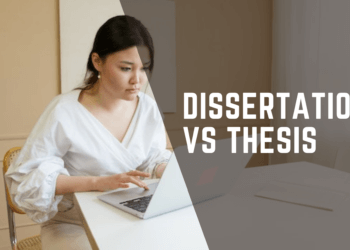
Dissertation vs Thesis: Your 2024 Guide

How To Apply to Grad School: Ultimate 2024 Guide

7 Best Laptops for Engineering Students in 2024

Leave a Reply Cancel reply
Your email address will not be published. Required fields are marked *
Save my name, email, and website in this browser for the next time I comment.
Recent Posts
- Applying to Big Tech This Year? Here’s How to Ace It.
- 73% of job seekers believe a degree is needed for a well-paying role–but is it?
- Graduate Certificate vs Degree: What’s the Difference? [2024 Guide]

© 2024 TheGradCafe.com All rights reserved
- Partner With Us
- Results Search
- Submit Your Results
- Write For Us
Should I Pursue A Master’s or A Ph.D.?

The first step in deciding on the right graduate program for you is to figure out which degree will best serve you—a master’s or a doctor of philosophy (Ph.D.). Here are a few factors to consider.
What are your career goals?
- Professional master’s: A good choice if you want to develop a particular skill set in order to practice a particular profession. This type of degree provides coursework focused on learning and practicing skills.
- Research master’s: A good fit if you want to gain expertise in a discipline and know how to teach it. A research master’s typically includes a research project or thesis and comprehensive exams in addition to coursework and provides experience in research and scholarship.
- Ph.D. (doctor of philosophy): Consider this option if your goal is to ground yourself in a body of research and develop the ability to add to that body of knowledge. Ph.D. study includes a major research project in addition to coursework, and a Ph.D. is the highest scholastic degree awarded by American universities. Contrary to common perception, career paths for Ph.D. graduates are quite varied, not just limited to academia. Ph.D. training helps you hones skills such as writing, research, teaching, data analysis, communicating complex topics—all of which can translate into many sectors, including industry, government, nonprofit, and entrepreneurship.
See career data for Duke graduate programs' alumni
How much time do you have to pursue a graduate degree?
Master’s degrees typically take two years to complete, while Ph.D. programs generally take five to seven years ( see Duke programs' time-to-degree ). That is a significant difference in commitment and opportunity costs. It might also play a key role in deciding which factors take higher priority as you evaluate a program. How does the length of the program fit with your career and family plans? How important is the surrounding community if you are going to be there for seven years instead of two? How long are you able or willing to go on a limited income while in graduate school?
How much can you afford to pay for a graduate degree?
Consider your personal financial situation (e.g., how much savings and student loans do you have), as well as how much financial aid you can get. Master’s and Ph.D. programs differ greatly in the amount of financial aid available. Ph.D. programs tend to offer significantly more financial support than master’s programs (but often will have research or teaching requirements).
A typical Ph.D. financial aid package usually includes coverage of tuition and fees, a living stipend, and some level of support for health insurance for a set number of years. For instance, Duke’s standard Ph.D. package covers tuition, mandatory fees, and a stipend for five years, as well as health insurance premiums for six years.
Within an institution, the level of financial support often differs across programs, so be sure to ask your specific program about the financial aid it offers. There are also many national organizations that provide competitive fellowships and scholarships for graduate students.
Know which degree you want to pursue? Here are some key things to look for in a program .
Degree to PhD requirements: Do you need a master’s to get a PhD?
Degree to PhD requirements aren’t merely an exhaustive list of things you should do to get into the most prestigious of academic qualifications — it’s a journey that will see you invest your time, effort, and money.
The first step is a bachelor’s degree, which usually takes up to three years and covers a subject of your choice.
While core modules are tied to your chosen subject, electives allow you to dabble in various areas and help you identify your interests, passions, and even expertise within a specific field.
Take law, for example. While all law students tend to pursue a law degree, they are free to pick whatever laws they want to specialise in during their second or third year.
If you are lucky, some universities even have modules with no exams — perfect for those who thrive on doing assignments.
One of the laws you can choose to specialise in is criminal law, where you defend the rights of someone who has been accused of a crime. Source: AFP
Right after, your postgraduate journey will see you completing a master’s degree.
Generally, these programmes last for a year, but some programmes, like an MBA, can take up to two years in certain countries (the US is one of them).
For those who are passionate about research or want to be an academic, pursuing a PhD is the next logical choice.
From learning more about what you are passionate about to leveraging the tools to make meaningful contributions to specific research fields, a PhD degree can help you dive into key areas and challenges in your field, develop your theoretical approach, and apply it through your research.
While not the most known route, it is possible to skip your master’s degree and pursue a PhD.
In Australia, a popular option is to take an honours degree before doing a PhD.
Generally, an honours degree is a one-year qualification taken after your bachelor’s degree, which involves further study in a particular discipline.
Here, under the guidance of an academic supervisor, you will choose a thesis topic, create a reading list and identify your method of research.
This programme is specifically designed to build your research abilities — opening the door for you to pursue a research degree, such as a PhD.
Do note that you would have to check with your institutions as to whether they accept an honours degree as a valid qualification to enrol on a PhD programme.
Some universities also offer fast-track PhDs. These do not require a master’s degree, but may require you to meet a panel of the university’s supervisor during your first PhD year to defend your research.
Walden University, for example, has a Fast Track Option that increases your course load up to three each term and spreads your dissertation courses to expedite your path through the programme.
While faster, it’s important to note that speed doesn’t always mean good. For some us, the gap between a bachelor’s degree and a PhD may be too great, making us work doubly hard to catch up.
This can be intense, and not suitable for everyone, especially if you factor in all the other requirements of doctoral study: travel to conferences, potential equipment failure, having to work a second job, to name a few.
Ultimately, the answer to the question “Do you need a master’s to get a PhD?” is one that’ll depend on some deep soul-searching on what you want and what you’re ready for.
If you prefer a more traditional, longer route to get a PhD, here’s all you need to know about doing a bachelor’s degree, a master’s and a PhD:
From degree to PhD: A step-by-step guide to your academic journey
Stage 1: laying the foundation — the bachelor’s degree.
The b achelor’s degree is the first step in the academic ladder. It is an undergraduate programme where you immerse yourselves in a subject of your choice.
Whether it’s the intricacies of astrophysics or the magic of storytelling in literature, you’ll immerse yourself in core courses, explore diverse electives, and hone essential skills like critical thinking and research.
A bachelor’s degree can expose you to the magic of storytelling in literature. Source: AFP
Getting your bachelor’s degree is a significant investment of time and money. Hence, picking the right major will influence your chances of securing some of the best-paying jobs in the employment market.
Three of the most common types of bachelor’s degrees are:
- Bachelor of Arts (BA): For those drawn to the humanities and social sciences, a BA in history, psychology, English, or communications could be your perfect fit. This degree emphasises critical thinking and communication skills, preparing you for diverse careers in education, human resources, writing, and government work.
- Bachelor of Science (BS): If your heart beats for the world of numbers, logic, and the natural world, a BS in biology, chemistry, finance, or computer science might be your calling. This degree focuses on quantitative skills and opens doors to exciting careers in STEM fields.
- Bachelor of Fine Arts (BFA): You can unleash your inner artist with a BFA in creative writing, theatre, drawing, or graphic design. This degree equips you with the skills and knowledge to pursue careers in the arts, from theatre production and museum curation to graphic design and animation.
Requirements to apply
To pursue a bachelor’s degree, you need a high school diploma or equivalent . Most universities require standardised test scores, such as the SAT or ACT, letters of recommendation and a personal statement.
If you’re an international student, you’ll need to show English language proficiency, such as TOEFL and IELTS.
Each institution may have specific criteria, so it’s essential to research and understand the requirements of your chosen university.
What will you gain?
Earning a bachelor’s degree is an investment in your future, providing a deep understanding of your field, critical thinking skills, and a broader perspective.
It opens doors to entry-level jobs and lays the groundwork for advanced studies at the master’s level.
A bachelor’s degree expands job opportunities. From 2020 to 2030, over 875,000 yearly job openings in business, science, engineering, education, healthcare, media, arts, and sports will require this qualification.
What’s more, it establishes a solid foundation for higher-paying jobs, with bachelor’s degree holders earning an average of US$1,001 per week compared to US$809 for those with only a high school diploma.
A master’s degree after completing your bachelor’s degree is the logical next step. Source: AFP
Stage 2: Specialising your expertise — The master’s degree
Upon completing your bachelor’s degree, pursuing a m aster’s degree becomes the logical next step — a programme tailored to deepen your expertise and specialise in a specific field.
Various options are available for obtaining your master’s degree, depending on your desired study area. Common types include the Master of Arts (MA) and the Master of Science (MS) , encompassing majors in the humanities, arts, social sciences, and natural sciences.
For those interested in business, library science, health, or a more specialised field, specific master’s degrees such as a Master of Business Administration (MBA) or a Master of Public Health (MPH) are attainable.
According to the National Centre for Education Statistics , the most frequently earned master’s degrees in the US are in business, education, and health professions.
A master’s degree typically ranges from one to three years, depending on the chosen field.
For instance, a standard MBA programme takes two years , while an MFA generally requires three years. Accelerated master’s programmes or dual degrees can expedite the completion time.
Those looking to work while pursuing their degree may find online master’s programmes beneficial. These programmes are usually designed asynchronous and self-paced, allowing flexibility in scheduling your learning.
Some master’s programmes won’t accept you without some form of experience. Source: AFP
To pursue a master’s degree, you need a bachelor’s degree in a related field . Some programmes necessitate relevant work experience, letters of recommendation, and a compelling statement of purpose.
Additionally, specific professional master’s programmes may require standardised test scores like the Graduate Record Examination (GRE) or Graduate Management Admissions Test (GMAT).
Once enrolled, students delve deeper into their chosen subject, engaging in research and internships. The focus shifts from general concepts to advanced theories and practical applications.
The culmination of a master’s programme often involves a thesis or a comprehensive examination demonstrating your mastery of the subject.
A master’s degree positions you for leadership roles while offering you higher earning potential and often have a competitive edge in the job market.
According to the US Bureau of Labor Statistics (BLS), individuals with a master’s degree in the earn a median of US$1,574 weekly , approximately US$81,848 annually.
What’s more, a master’s degree serves as a foundation for those considering a PhD, offering a robust groundwork for advanced research.
A PhD is an advanced degree students can use to maximise their expertise in a particular field. Source: AFP
Stage 3: Pinnacle of academic achievement — The PhD
A PhD is an advanced degree students can use to maximise their expertise in a particular field. Offered in several disciplines, this is often the highest formal education a student can earn through universities and colleges.
If you want to pursue a career in academia as a researcher or a professor, you’ll most likely need a PhD.
PhD programmes are often three to four years long. You’ll perform tasks like research, writing and professional work that contribute to a particular field of study, like science, mathematics or the English language.
Earning your doctorate means that you have expert-level knowledge in your chosen field. It would help if you got a PhD because you’re passionate about a particular subject and are ready to exponentially expand your understanding of that topic through research.
Professor Paul KH Tam, Pro Vice-Chancellor and Vice President (Research) at the University of Hong Kong, emphasises the transformative potential of a PhD , stating:
“A PhD is about pursuing knowledge for the passion of acquiring knowledge. If one is fortunate, one’s discovery/invention may even change society.”
Pursuing a PhD requires a master’s degree in a related field .
Admission is highly competitive, and universities often seek exceptional academic achievements, relevant research experience, strong letters of recommendation, and a compelling research proposal.
Standardised test scores may be required, depending on the programme.
Today’s job market is competitive. With more and more students earning bachelor’s and even master’s degrees, making your PhD will set you apart from the pack.
The rewards of a PhD are profound. Beyond the title of “Doctor,” graduates gain recognition as experts in their field. They contribute to academic discourse, publish research in prestigious journals, and often secure university faculty positions.
Earning a PhD will also make you more qualified for various industry jobs. Through your graduate studies, you’ll develop the skills employers value and seek in new hires.
According to the Bureau of Labor Statistics, those with a doctoral degree can expect higher earnings — US$1,909 weekly — and lower unemployment rates compared to those with a bachelor’s or master’s degree.
Popular stories
The most prestigious canadian universities in 2024, you’re doing resumes the hard way: 10 best resume-maker apps that are free, fast and easy to use, no coding skills, no problem: these high-paying jobs in ai welcome everyone, the most affordable canadian universities in 2024 that won’t break the bank.
- Graduate School
Is it Possible to Get a PhD Without a Master’s Degree?
Featured Expert: Dr. Abha Sood, PhD

Do you need a master’s to a get a PhD? No! A master’s degree is not a universal requirement for all PhD programs, and there are some types of programs which waive the master’s degree. If you’re interested in how to get a PhD but you want to shorten the time it takes to graduate, you do have options. While they are not numerous, there are excellent, accredited PhD programs in almost every field which do not require a master’s degree. In this blog, learn how you can get a PhD without a master’s, what your program options are and what you need to do to get accepted.
>> Want us to help you get accepted? Schedule a free strategy call here . <<
Listen to the blog!
Article Contents 9 min read
Do you need a master’s to get a phd.
The short answer: No . It is possible to get a PhD without a master’s degree, as there are programs which accept applicants who have not completed a master’s degree first.
We’ll explore these in more detail below, but first we’ll look at whether a PhD is the right path for you and why you might want to skip the master’s.
If you’re weighing your options for graduate school and deciding between a master’s or PhD , you’re probably wondering which one is the best choice for you and how to complete your studies in the fastest way possible. If your end goal is a PhD, you might be looking at a very long educational commitment. How long does it take to get a PhD? On average, 4-7 years, and this timeline doesn’t include the time it takes to get a master’s degree, another 1 or 2 years.
Chances are, you’ve finished 4 years of an undergraduate degree or you’re still earning your bachelor’s degree and thinking ahead a few years. The idea of 5+ more years of schooling can be a little intimidating, so you may be wondering how to get a PhD without a master’s.
There are few different types of PhD programs that do not require a master’s degree first. Note that all of these programs DO require a complete bachelor’s degree to apply! We’ll explain what your options are for completing a PhD without a master’s below.
1. Direct Entry PhD Programs
Direct Entry PhD programs allow students with a Bachelor’s degree to apply directly for a PhD in their field, without first completing a master’s degree. They are typically 4-5 years long, so they are appealing for students who want to earn a graduate degree and shave a few years off their timeline to graduation. Many of the top colleges in the US and the universities in Canada offer these types of programs. However, these programs are far from the easiest PhD programs to get into ! They are quite competitive and require specific admission requirements you’ll need to meet in order to be considered.
2. Online PhD Programs
Online PhD programs are growing in both number and popularity. Online PhD programs offer students greater flexibility while also shortening the time it takes to get a PhD. Most online PhD programs are between 2 and 3 years, although there are 4-year programs and even 1-year online PhD programs out there. Depending on your area of study, an online PhD may not be an option, but there are fully accredited options out there. And, some online PhD programs don’t require a master’s degree.
Curious about whether a Master’s or PhD is right for you? Check out this video:
Direct Entry PhD Programs
Direct entry PhD programs can be a great option for students who want to jump straight from a bachelor’s degree to a PhD. This type of program is available in almost all disciplines, including business, computer science, education and nursing. These are also sometimes called accelerated PhD programs, designed to be 4-5 years and on your way to graduation sooner. As long as you meet all the admission requirements, you can apply to direct entry PhD programs without a master’s degree.
Universities with Direct Entry PhD Programs
Here are a few examples of top universities with direct entry PhD programs. This is not an exhaustive list, as there are many similar programs across the US and Canada!
Pros and Cons of Direct Entry PhD Programs
Since direct entry PhD programs accept students with a bachelor\u2019s degree only, the admission standards are naturally a little higher. Your academic record needs to be above average, and the minimum GPA to apply is usually 3.0 or even higher in some cases. On top of a stellar GPA, you also need to write the GRE, complete an application package and demonstrate you are ready for intense graduate level study without having completed a master\u2019s degree. ","label":"Cons","title":"Cons"}]" code="tab1" template="BlogArticle">
Admission Requirements for Direct Entry PhD Programs
Along with the usual PhD admission requirements, direct entry PhD programs may only admit students with only a bachelor’s degree if they demonstrate exceptional academic ability and extensive prior research experience. Here are some of the additional requirements you can expect for direct entry PhD programs:
- 4-year undergraduate degree (minimum GPA may be required)
- GRE (or GMAT, program-dependent)
- Research Experience
- Previous publications
- Excellent letters of recommendation
- Letter of Intent
- Research interest statement
- Grad school career goals statement
- Research Proposal
- Grad school interview
There are dozens of different online PhD programs out there, ranging from 1 to 4 years long. The length of time it takes to complete an online PhD program depends on the discipline. Online PhD programs are more common in fields like nursing, health sciences, business, education, criminology, engineering and computer science, though there are many more.
Many online PhD programs also have a hybrid learning option, where students can learn both online and in-person at the university. This gives you a little more flexibility and allows you to get the best of both worlds from an online PhD and a traditional one.
Online PhDs are also a good option if you want to do a PhD without dissertation or thesis, since a few of them don’t require it.
Universities with Online PhD Programs
Here’s a short list of universities that offer online PhD programs, but keep in mind there are many more out there.
Pros and Cons of Online PhD Programs
Lack of funding and networking : 100% online programs of course, lack the opportunities for in-person interaction and have fewer opportunities for professional networking in your field. There\u2019s also fewer funding options for online PhDs, if the program is not fully funded. ","label":"Cons","title":"Cons"}]" code="tab2" template="BlogArticle">
Admission Requirements for Online PhD Programs
Online PhD programs, or hybrid programs, will have the same admission requirements as most graduate school programs. On top of these, you will typically need a GPA of 3.0 and above, and you may need to complete specific prerequisite coursework.
The specific admission requirements will vary a little by program, but in general there won’t be anything unexpected.
If you’re thinking of applying to a PhD without a master’s degree, there are pros and cons to this decision. You may be wondering if not having a master’s degree will hurt your chances of getting accepted to a PhD program, or if it affects your chances of finding a job after graduate school.
While you can certainly choose to skip the master’s and still achieve your career goals with a PhD only, you should carefully consider your decision before you start applying to be sure it’s the right path for you.
Before you dive into PhD applications, consider the following things:
1. A PhD might not be necessary
Earning a PhD might not actually be necessary or especially helpful to achieving your career goals. A PhD is a research-focused, academic pursuit, so if your aim is to transition from academia to industry or find an industry job after a PhD , you might benefit more from earning years of work experience rather than years of education. There is always a possibility to pursue a PhD after a few years of working in your field if you change your mind.
In other cases, a master’s degree might give you the better mix of education and skill to achieve your career goals. And, a master’s degree is shorter and less expensive than a PhD, not to mention less competitive to get into.
On the other hand, if you are a true academic and want to find a job in academia , fast-tracking your PhD is a good way to do so!
2. A Master’s degree can give you a competitive edge
Having a master’s degree can actually give you a competitive edge for getting into some PhD programs. For example, even a direct entry PhD program that considers exceptional undergraduate students might give preference to a student with a full master’s degree if there is limited space in a program. Not to mention, not all PhD programs accept you without a master’s degree, and the ones that don’t require one will be more challenging to get into.
Completing your master’s first can also give you better and more funding opportunities for your PhD, if your program is not fully funded, since some scholarships and loans are only open to current graduate students.
3. A PhD is a huge commitment
Getting your PhD is a huge commitment of both your time and money, so you need to be certain it is the right choice for you before you put in the effort of applying and completing a program. Jumping from a bachelor’s right into an advanced graduate program is a big shift in the level of academic rigor and expectations, and not every student will be prepared for it.
Undergraduate students normally will not have the research experience or professional skillset that you would develop throughout the course of a master’s program. So the adjustment to a PhD program may prove to be too big a gap.
A master’s program is a sort of test-drive for graduate school study, introducing you to a higher level of education, research and learning. It’s also shorter and less expensive. So, you may not lose a much from changing your mind and dropping out of a master’s program as you will dropping out of a PhD.
Keep in mind that if you want to pursue advanced study in a new field or change jobs after working as an undergraduate, it will be difficult to find a PhD program that will accept you without a master’s degree.
Do you need a master’s to get a PhD? No, it is not strictly necessary. However, there are some advantages to earning your master’s degree first, and the path from bachelor’s straight to PhD is a little more challenging.
For those who are willing to commit and put in the hard work, the benefits of fast-tracking your PhD are definitely worth it, but you should carefully explore all your options and be sure of what requirements you need to meet first.
No. It is possible to get a PhD without a master’s degree. Some PhD programs accept exceptional students with a bachelor’s degree or allow you to earn a master’s and PhD in a combined, accelerated program.
While it is possible to skip your master’s and go straight to a PhD, you should consider what the options are, what the admission requirements are and whether graduate school is the right choice for you. Earning a PhD is a big commitment, so you need to be sure it’s a worthy pursuit!
Yes, direct entry PhD programs are highly competitive and the admission standards are usually quite high. These types of programs usually accept exceptional students who stand out from the crowd.
The shortest PhD programs are 1-year online degrees. While there are not many available, it is possible to earn a PhD in select fields, completely online, in around 12 to 18-months.
Traditional PhDs take between 4-8 years to complete. Direct entry PhD programs are usually 4-5 years, and online or hybrid PhDs can be between 2-3 years.
Yes, there are dual degree programs that allow you to earn a master’s alongside a PhD, shortening the traditional timeline and saving a bit on tuition costs.
A master’s degree is a graduate program that focuses on teaching you practical, career-related skills and knowledge. It’s designed for you to learn more advanced skills in your field so you can potentially increase your earnings in the workforce and pursue higher-level positions. A PhD is a heavily research-focused graduate degree. PhD students contribute new knowledge to their field through critical research and writing.
It can be tough to decide whether to stop at a master’s degree or go forward and pursue a PhD. The decision will come down to your personal choice, the requirements for your chosen career or position, your budget, timeline, and whether you feel you can and want to commit to extensive graduate studies.
Want more free tips? Subscribe to our channels for more free and useful content!
Apple Podcasts
Like our blog? Write for us ! >>
Have a question ask our admissions experts below and we'll answer your questions, get started now.
Talk to one of our admissions experts
Our site uses cookies. By using our website, you agree with our cookie policy .
FREE Training Webinar:
How to make your grad school application stand out, (and avoid the top 5 mistakes that get most rejected).
Time Sensitive. Limited Spots Available:
We guarantee you'll get into grad school or you don't pay.
Swipe up to see a great offer!
Do You Need a Masters to Get a PhD?
Do you need a masters to get a PhD? If you have a bachelors and are considering going for a doctorate, you might be wondering this same question.

Options vary by program and school, but many schools do provide opportunities for students to apply to a PhD degree program without a master’s degree.
Editorial Listing ShortCode:
Going directly from a bachelors to PhD can have a number of pros and cons, depending on your situation.

Many universities allow you to apply to a PhD degree program without a master’s degree. Some schools will require that you earn a masters along the way, though. By getting a PhD without a master’s, you may have a chance to save time and money.
That said, it may be more difficult to get accepted or to compete with other applicants if you don’t already have a master’s degree. If you are hoping to skip the master’s degree, you’ll likely need prior upper-division coursework aligned with your PhD objectives. This coursework may be completed in your bachelor program, if available.
If you’re pivoting to a new academic field of inquiry or to a new career, getting a masters degree online or in the classroom may be more realistic and advantageous. Post-baccalaureate course credits and work experience related to your area of academic interest may add to your qualifications for going straight into a PhD degree program without a masters.
Getting a PhD without a master’s is not uncommon, but you also have the options of getting a master’s degree first or applying to a PhD program that allows you to earn a masters along the way.
Should I Go Straight to PhD After Bachelors?

You’ll likely save time and money if you apply to direct entry PhD programs after a bachelors. It is helpful to keep in mind, though, that PhD programs require time and extensive research. One advantage with the masters before PhD pathway is that it gives you a chance to explore the graduate program without making a full commitment to a longer PhD track.
If you were to decide after a year or two that a lengthy doctoral program is just not right for you, then you can end your study and likely have a masters in hand as a reward for your efforts.
If you go straight into a PhD program that doesn’t include a master’s degree along the way, then you may leave largely empty handed if you don’t finish or don’t complete your dissertation, despite years of study and tuition costs. That said, it could certainly make sense for you to go straight into a PhD program, depending on your circumstances.
If you have a strong interest in your chosen academic field and have some experience studying and working in that field, then it may be advantageous to go straight into a PhD program that’s aligned with your interests and career goals.
Can You Get a PhD Without a Masters?

Going straight for a PhD after a bachelors degree can be done, though the options will vary from school to school.
Universities that allow you to apply to a PhD program without a master’s degree will likely require you to hold a bachelors in a subject area that is the same as or closely related to the doctoral program.
In most cases school admission officers may also be looking for evidence that you are prepared for the academic challenges of a PhD program. So, they may want to see a master’s GPA for PhD admissions, which you would lack if you applied for direct entry PhD programs.
You may want to consider what work or learning achievements can help qualify you for admissions. Those qualifications can then be presented in a resume or in letters of recommendation.
Some schools may only qualify you if you have other course work, subject-area certifications, or work experience related to the field, in addition to your bachelor’s degree.
Should I Get a Masters or a PhD?

Is a PhD worth it ? Should you just stick with a masters? While both graduate programs involve advanced coursework and at least some research, there are several factors to consider when deciding whether to get a masters or a PhD.
A masters might be best when:
- You’re seeking to fulfill specific job requirements . For example, a masters is needed to work as an IT specialist, a secondary teacher, therapist, accountant, or business manager.
- You want to qualify for promotions . A masters can help you advance your skills and knowledge to qualify for promotions in your field. A PhD is often not required to work in roles that have more responsibility, that require more expertise, or that lead to greater seniority.
- Your bachelors is not conducive with your career goals . If you have a bachelor’s degree that is not well aligned with your present career goals or interests, a masters may allow you to quickly gain a strong foundation to help you pivot to a new career.
A Ph.D. might be best when:
- You want to dive into research . If your academic interests include doing extensive, original research that advances knowledge in your area of specialization, then getting a PhD may be the path for you.
- You want a career in academia . If your goal is to pursue a career in academia and either teach at a university or engage in original research for consulting or advocacy work, you’ll likely need a PhD to qualify and to acquire the needed expertise.
Can You Get a PhD Without a Bachelors?
You will need a bachelors before you can qualify to get into a PhD program. If your interests or your specific career goals dictate getting a PhD, you may save time and money by going straight into a doctorate program once you have completed your bachelors.
Even if you decide to get a masters before entering a PhD program or earn one as part of a PhD program, you’ll first need to get a bachelors.
How Long Does It Take to Get a Masters vs. PhD?

Since getting a graduate degree requires you to have a bachelors beforehand, you will already have completed all or most of any required lower-division general education requirements.
Even though the time it takes will vary by university and program, you should be able to get a master’s degree in about 1 to 2 years. But how long does it take to get a doctorate degree ? A doctorate program entails more extensive research and dissertation writing requirements, so it typically takes 3 to 5 years to get a PhD.
Any capstone project, whether for a masters or a PhD—such as a practicum, internship, or dissertation—may factor in to how long it can take you to receive your degree.
Is It Easier to Get into a PhD Program with a Masters?

Earning your master’s degree prior to applying to a PhD program may offer some advantages. Having a bachelors may qualify you to apply for PhD programs at many universities.
On the other hand, a bachelors may not provide you with the qualifications you need to get accepted or to be competitive with other applicants, especially in high-demand programs or at more selective graduate schools.
Getting a masters first can be a great way to sharpen your academic skills and to build a more impressive academic resume, making you a more qualified and competitive PhD degree program applicant.
Your masters program coursework and research may also help you identify the areas of specialized research that will most interest you in your PhD program. This can allow you to be more selective about schools, identifying the ones that are best aligned with your interests or that have the most promising academic colleagues.
Last but not least, getting a masters can help prepare and motivate you to do the kind of extensive research and writing required by a PhD degree program.
If you do decide that earning a masters is the best route for you, but are busy with work or family, you may want to note that some universities offer part time masters programs , which may fit in better with your busy life.
What Is the Difference Between a Masters vs. PhD?

With a masters program, you can quickly access upper-division course work that gives you mastery of core knowledge and expertise in your area of academic study.
A masters is likely to be a great way to increase your job qualifications with just a couple years of study. Career fields that can benefit from a masters include technology, engineering, communications, finance, counseling, business management, or organizational leadership.
A PhD may be required if you want to get the best jobs in senior administration, analysis, consulting, or advocacy roles in school administration. A PhD may also be needed for certain roles in leadership development, in the social sciences, or in public policy.
If you’re studying the humanities and want to work in academia as a university professor and researcher, for example, you’ll likely need a PhD. For some roles, you may also benefit from the research skills and expertise you gain from a PhD program.

Getting Your PhD Online

Earning a PhD means you have the chance to become a thought leader in your field down the road.
Whatever your area of academic interest, there are many accredited graduate schools that will allow you to get a PhD without a master’s. Many of these schools also offer accredited online programs to provide study options tailored to your needs.
It’s never too early to start exploring accredited online PhD programs to find the one that best suits your needs and your career goals.


Do you need a masters to get a PhD? [Straight to PhD without a masters]
Are you toying with the idea of jumping straight from your Bachelor’s to a PhD?
Wondering whether it’s even possible to bypass the Master’s degree and make a beeline for that doctorate? Many budding scholars question whether they need a Master’s to get a PhD or can venture on a more streamlined academic journey.
The truth is, yes, it’s possible to get a PhD without a Master’s, but it’s not a route everyone can or should take.
It’s a personal and strategic decision, hinging on a range of factors, from your academic performance to your research skills and the field of study.
In this blog post, we delve into the nuanced world of pursuing a PhD without a Master’s degree.
We’ll examine a real-life case study, explore the steps involved, estimate the duration, and weigh the pros and cons.
Whether you’re an undergraduate dreaming of a doctorate or a Bachelor’s graduate pondering your next steps, read on to unravel the intricacies of this frequently asked question in academia.
Can You Get a PhD without a Masters? Straight from your bachelor
Yes, you can get a PhD without having a Masters degree. Some come straight from the bachelor’s degree with no issues.

The prerequisites for a PhD vary by field and institution, but there are circumstances where exceptional undergraduates may transition directly into a PhD program.
For this, you need to demonstrate exceptional academic performance, usually through a first-class honors degree.
Real-world experience can also be a factor, especially in applied fields where professional contacts can be beneficial. It’s advantageous to have a good rapport with potential PhD supervisors, perhaps ones who taught you during your undergraduate studies, as they can vouch for your capabilities.
Your undergraduate research, especially if it aligns closely with your intended PhD area, can also provide leverage.
However, keep in mind that competition is fierce, and many successful PhD applicants hold a Master’s degree.
While not impossible, skipping the Master’s step is challenging, and requires diligent planning and effort. Master’s degrees can also equip you with important research skills, making the PhD journey more manageable.
So, if you’re determined to proceed directly from undergraduate to PhD, carefully weigh the benefits and challenges.
A case study:
A determined undergraduate, set a bold goal: to enter a Clinical Psychology PhD program without the transitional master’s. She customized her undergraduate years to match the competitiveness of a master’s candidate. High grades and impressive GRE scores were only the beginning. The student became involved in a research lab, providing firsthand experience with cognitive behavioral therapy for psychosis. Successfully bypassing the Master’s stage, This students journey demonstrates that strategic undergraduate planning and unwavering dedication can, indeed, lead directly to a PhD.
PhDs without a Masters – How Does It Work?
To pursue a PhD without a Master’s, you have to consider several crucial steps to convince a professor and research institute that you are the right candidate for this opportunity:
- Outstanding Undergraduate Performance : Aim for exceptional academic results, ideally achieving a first-class honours degree. This proves your academic prowess and dedication, factors that potential PhD supervisors highly regard.
- Focused Research Interest : Align your undergraduate research, including your dissertation, with your prospective PhD field. Your experience and research during your undergraduate studies could make you a compelling candidate despite not having a Master’s degree.
- Network : Cultivate a good rapport with potential PhD supervisors, preferably those who taught you during your undergraduate studies. Their knowledge of your abilities can be crucial in their decision to support your PhD application.
- Gain Relevant Experience : If you’re considering an applied field, try to gain real-world, practical experience. This experience, particularly if you make professional contacts, can be an added advantage.
- Application : Apply to universities that accept PhD candidates without a Master’s. Craft a persuasive application detailing your strengths, passion for the field, research interests, and relevant experiences.
Remember, pursuing a PhD without a Master’s is challenging due to stiff competition from Master’s degree holders. It requires exceptional strategic planning, unrelenting dedication, and resilience. It’s also worth considering that a Master’s degree can provide you with invaluable research skills, and might make your PhD journey smoother.
How Long Does It Take to Get a PhD Without a Masters?
Getting a PhD without a Master’s degree will typically take about the same length of time as if you had a Master’s degree, but the time can vary depending on the program, country, and individual dedication. Here’s a breakdown with approximate timelines:
In total, it typically takes about 5-7 years after your undergraduate degree to complete a PhD. It is essential to note that these durations are averages and can vary significantly based on individual pace, the field of study, program structure, and university policies.
This timeline also assumes a full-time commitment to your PhD studies. Part-time studies would extend the duration. Furthermore, the process can be expedited or prolonged based on the success of your research, any setbacks you encounter, or personal circumstances.
Should you do a PhD program without a Masters?
Deciding to pursue a PhD without first earning a Master’s degree is an intensely personal choice, often contingent on an individual’s academic journey and goals.
Securing a Master’s degree before entering a PhD program usually enriches your understanding of the field, refines your research skills, and may increase your chances of securing admission to a PhD program.
Without a Masters, you may face a competitive application process and potentially be at a disadvantage.
However, some determined undergraduates, with substantial research experience, successfully bypass the Master’s and head straight to a PhD, saving time and tuition.
This, known as an integrated or direct entry PhD program, however, requires meticulous planning, diligent research work, and unwavering commitment.
Wrapping up – Go straight to PhD from undergrad
Venturing straight from a Bachelor’s degree to a PhD, bypassing a Master’s, is a viable yet demanding route.
Navigating this academic journey requires meticulous planning, exceptional undergraduate performance, focused research interest, networking, relevant experience, and a persuasive application.
Remember, the academic competition is fierce, and most successful PhD students have completed a Master’s first. If you’re determined to proceed directly into a PhD program, weigh the benefits, challenges, and potential disadvantages.
Integrated or direct-entry PhD programs can save time and money, but also demand a substantial commitment to your research skills and academic experience.
Each journey is personal, so consider your own aspirations, capabilities, and the programs you’re interested in before making your decision.

Dr Andrew Stapleton has a Masters and PhD in Chemistry from the UK and Australia. He has many years of research experience and has worked as a Postdoctoral Fellow and Associate at a number of Universities. Although having secured funding for his own research, he left academia to help others with his YouTube channel all about the inner workings of academia and how to make it work for you.
Thank you for visiting Academia Insider.
We are here to help you navigate Academia as painlessly as possible. We are supported by our readers and by visiting you are helping us earn a small amount through ads and affiliate revenue - Thank you!

2024 © Academia Insider
How Long Does It Take to Get a Ph.D. Degree?
Earning a Ph.D. from a U.S. grad school typically requires nearly six years, federal statistics show.
How Long It Takes to Get a Ph.D. Degree

Caiaimage | Tom Merton | Getty Images
A Ph.D. is most appropriate for someone who is a "lifelong learner."
Students who have excelled within a specific academic discipline and who have a strong interest in that field may choose to pursue a Ph.D. degree. However, Ph.D. degree-holders urge prospective students to think carefully about whether they truly want or need a doctoral degree, since Ph.D. programs last for multiple years.
According to the Survey of Earned Doctorates, a census of recent research doctorate recipients who earned their degree from U.S. institutions, the median amount of time it took individuals who received their doctorates in 2017 to complete their program was 5.8 years. However, there are many types of programs that typically take longer than six years to complete, such as humanities and arts doctorates, where the median time for individuals to earn their degree was 7.1 years, according to the survey.
Some Ph.D. candidates begin doctoral programs after they have already obtained master's degrees, which means the time spent in grad school is a combination of the time spent pursuing a master's and the years invested in a doctorate. In order to receive a Ph.D. degree, a student must produce and successfully defend an original academic dissertation, which must be approved by a dissertation committtee. Writing and defending a dissertation is so difficult that many Ph.D. students drop out of their Ph.D. programs having done most of the work necessary for degree without completing the dissertation component. These Ph.D. program dropouts often use the phrase " all but dissertation " or the abbreviation "ABD" on their resumes.
According to a comprehensive study of Ph.D. completion rates published by The Council of Graduate Schools in 2008, only 56.6% of people who begin Ph.D. programs earn Ph.D. degrees.
Ian Curtis, a founding partner with H&C Education, an educational and admissions consulting firm, who is pursuing a Ph.D. degree in French at Yale University , says there are several steps involved in the process of obtaining a Ph.D. Students typically need to fulfill course requirements and pass comprehensive exams, Curtis warns. "Once these obligations have been completed, how long it takes you to write your dissertation depends on who you are, how you work, what field you're in and what other responsibilities you have in life," he wrote in an email. Though some Ph.D. students can write a dissertation in a single year, that is rare, and the dissertation writing process may last for several years, Curtis says.
Curtis adds that the level of support a Ph.D. student receives from an academic advisor or faculty mentor can be a key factor in determining the length of time it takes to complete a Ph.D. program. "Before you decide to enroll at a specific program, you’ll want to meet your future advisor," Curtis advises. "Also, reach out to his or her current and former students to get a sense of what he or she is like to work with."
Curtis also notes that if there is a gap between the amount of time it takes to complete a Ph.D. and the amount of time a student's funding lasts, this can slow down the Ph.D. completion process. "Keep in mind that if you run out of funding at some point during your doctorate, you will need to find paid work, and this will leave you even less time to focus on writing your dissertation," he says. "If one of the programs you’re looking at has a record of significantly longer – or shorter – times to competition, this is good information to take into consideration."
He adds that prospective Ph.D. students who already have master's degrees in the field they intend to focus their Ph.D. on should investigate whether the courses they took in their master's program would count toward the requirements of a Ph.D. program. "You’ll want to discuss your particular situation with your program to see whether this will be possible, and how many credits you are likely to receive as the result of your master’s work," he says.
How to Write M.D.-Ph.D. Application Essays
Ilana Kowarski May 15, 2018

Emmanuel C. Nwaodua, who has a Ph.D. degree in geology, says some Ph.D. programs require candidates to publish a paper in a first-rate, peer-reviewed academic journal. "This could extend your stay by a couple of years," he warns.
Pierre Huguet, the CEO and co-founder of H&C Education, says prospective Ph.D. students should be aware that a Ph.D. is designed to prepare a person for a career as a scholar. "Most of the jobs available to Ph.D. students upon graduation are academic in nature and directly related to their fields of study: professor, researcher, etc.," Huguet wrote in an email. "The truth is that more specialization can mean fewer job opportunities. Before starting a Ph.D., students should be sure that they want to pursue a career in academia, or in research. If not, they should make time during the Ph.D. to show recruiters that they’ve traveled beyond their labs and libraries to gain some professional hands-on experience."
Jack Appleman, a business writing instructor, published author and Ph.D. candidate focusing on organizational communication with the University at Albany—SUNY , says Ph.D. programs require a level of commitment and focus that goes beyond what is necessary for a typical corporate job. A program with flexible course requirements that allow a student to customize his or her curriculum based on academic interests and personal obligations is ideal, he says.
Joan Kee, a professor at the University of Michigan with the university's history of art department, says that the length of time required for a Ph.D. varies widely depending on what subject the Ph.D. focuses on. "Ph.D. program length is very discipline and even field-specific; for example, you can and are expected to finish a Ph.D, in economics in under five years, but that would be impossible in art history (or most of the humanities)," she wrote in an email.
Kee adds that humanities Ph.D. programs often require someone to learn a foreign language, and "fields like anthropology and art history require extensive field research." Kee says funding for a humanities Ph.D. program typically only lasts five years, even though it is uncommon for someone to obtain a Ph.D. degree in a humanities field within that time frame. "Because of this, many if not most Ph.D. students must work to make ends meet, thus further prolonging the time of completion," she says.
Jean Marie Carey, who earned her Ph.D. degree in art history and German from the University of Otago in New Zealand, encourages prospective Ph.D. students to check whether their potential Ph.D. program has published a timeline of how long it takes a Ph.D. student to complete their program. She says it is also prudent to speak with Ph.D. graduates of the school and ask about their experience.
Online Doctoral Programs: What to Expect
Ronald Wellman March 23, 2018

Kristin Redington Bennett, the founder of the Illumii educational consulting firm in North Carolina, encourages Ph.D. hopefuls to think carefully about whether they want to become a scholar. Bennett, who has a Ph.D. in curriculum and assessment and who previously worked as an assistant professor at Wake Forest University , says a Ph.D. is most appropriate for someone who is a "lifelong learner." She says someone contemplating a Ph.D. should ask themselves the following questions "Are you a very curious person... and are you persistent?"
Bennett urges prospective Ph.D. students to visit the campuses of their target graduate programs since a Ph.D. program takes so much time that it is important to find a school that feels comfortable. She adds that aspiring Ph.D. students who prefer a collaborative learning environment should be wary of graduate programs that have a cut-throat and competitive atmosphere, since such students may not thrive in that type of setting.
Alumni of Ph.D. programs note that the process of obtaining a Ph.D. is arduous, regardless of the type of Ph.D. program. "A Ph.D. is a long commitment of your time, energy and financial resources, so it'll be easier on you if you are passionate about research," says Grace Lee, who has a Ph.D. in neuroscience and is the founder and CEO of Mastery Insights, an education and career coaching company, and the host of the Career Revisionist podcast.
"A Ph.D. isn't about rehashing years of knowledge that is already out there, but rather it is about your ability to generate new knowledge. Your intellectual masterpiece (which is your dissertation) takes a lot of time, intellectual creativity and innovation to put together, so you have to be truly passionate about that," Lee says.
Curtis says a prospective Ph.D. student's enthusiasm for academic work, teaching and research are the key criteria they should use to decide whether to obtain a Ph.D. degree. "While the time it takes to complete a doctorate is an understandable concern for many, my personal belief is that time is not the most important factor to consider," he says. "Good Ph.D. programs provide their students with generous stipends, health care and sometimes even subsidized housing."
Erin Skelly, a graduate admissions counselor at the IvyWise admissions consulting firm, says when a Ph.D. students struggles to complete his or her Ph.D. degree, it may have more to do with the student's academic interests or personal circumstances than his or her program.
"The time to complete a Ph.D. can depend on a number of variables, but the specific discipline or school would only account for a year or two's difference," she wrote in an email. "When a student takes significantly longer to complete a Ph.D. (degree), it's usually related to the student's coursework and research – they need to take additional coursework to complete their comprehensive exams; they change the focus of their program or dissertation, requiring extra coursework or research; or their research doesn't yield the results they hoped for, and they need to generate a new theory and conduct more research."
Skelly warns that the average completion time of a Ph.D. program may be misleading in some cases, if the average is skewed based on one or two outliers. She suggests that instead of focusing on the duration of a particular Ph.D. program, prospective students should investigate the program's attritition and graduation rates.
"It is worthwhile to look at the program requirements and the school's proposed timeline for completion, and meet current students to get their input on how realistic these expectations for completion are," Skelly says. "That can give you an honest idea of how long it will really take to complete the program."
Searching for a grad school? Access our complete rankings of Best Graduate Schools.
Tags: graduate schools , education , students
You May Also Like
Find a strong human rights law program.
Anayat Durrani April 18, 2024

Environmental Health in Medical School
Zach Grimmett April 16, 2024

How to Choose a Law Career Path
Gabriel Kuris April 15, 2024

Questions Women MBA Hopefuls Should Ask
Haley Bartel April 12, 2024

Law Schools With the Highest LSATs
Ilana Kowarski and Cole Claybourn April 11, 2024

MBA Programs That Lead to Good Jobs
Ilana Kowarski and Cole Claybourn April 10, 2024

B-Schools With Racial Diversity
Sarah Wood April 10, 2024

Law Schools That Are Hardest to Get Into
Sarah Wood April 9, 2024

Ask Law School Admissions Officers This
Gabriel Kuris April 9, 2024

Grad School Housing Options
Anayat Durrani April 9, 2024

Do you Need a Masters to Get a PhD?
So, you’ve earned your bachelor’s degree successfully with outstanding grades and incredible research skills. Well, one of your biggest dreams is to become doctor of philosophy in your relevant area; but a master’s degree lies in-between. Thus, you want to know: do you need a Masters to get a PhD? Or is it possible to continue a PhD without a master’s degree?
However, the customary path to get a PhD is to obtain a bachelor’s degree preceded by a master’s degree, then comes the PhD. Nonetheless, a few students prefer to avoid a master’s degree to get enrolled in a doctoral program in order to complete their studies earlier.
So, stick to this article till the end to get the answer for can you get a PhD without a masters?
Not necessarily!
A master’s degree is not essentially required to get a PhD. There are plenty of universities that offer PhD without masters right after bachelor’s completion. These organizations do not demand students to get a master’s degree to fulfill the admission criteria.
In other cases, some PhD programs allow students to bypass a master’s degree and enroll in the doctorate degree directly after the bachelor’s degree. Several institutes also offer dual enrollment programs. These programs allow students to acquire a master’s graduate degree during their PhD.
Anyhow, plenty of educational institutes offer one-year master’s programs that are useful for students to save their time for the enrollment of a PhD. This master’s degree provides students more discoverability opportunities before going for a doctoral program.
Now, you know that you can get a PhD without a master. But also consider some of the pros and cons of skipping a master’s degree to get a PhD.

GET ACADEMIC WRITING HELP
Your assignment won’t be delivered on time: you’ll get it beforehand. Review your work immediately and ask for free revisions right away. Get extensive help in:

Benefits of Skipping a Master’s Degree
When you bypass a masters to directly enroll in a PhD program, you would find various advantages of doing it.
Timing Opportunities
Sometimes, enrolling in a master’s degree may reduce the opportunities to acquire a doctoral degree for students. When you skip this program, you can afford to get enrolled in a PhD program of your choice and get an opportunity to write a research paper to fulfill your dream.
Time and Cost-Efficient
It is obvious that enrolling for a doctoral program directly after the bachelor’s degree absolutely saves your time and money as well. You don’t have to spend two years obtaining a master’s degree. Also, you would save money from the master’s degree fees.
More Time for Research
If you want more time to complete your PhD research, then avoiding a master’s degree is worth it. When you enroll in a master’s program, your time would be limited to get your PhD dissertation done. It would become challenging to set up and execute long-term projects required for your thesis. However, enrolling straight to PhD provides you adequate time to do elaborated research and conduct other tasks for the best output.
More Funding Opportunities
Funding is another amazing benefit of enrolling in a PhD program. Most PhD programs offer students with full or partial funding along with stipend over their tuition waiver. There are a number of external funding opportunities as well including major fellowship and national scholarships that prefer PhD students over masters.
Better Job Opportunities
If you’re only a master’s degree holder, but with a good experience in your relevant field, a PhD scholar would still get a good designation without even any experience. Even many universities prefer candidates with PhDs for teaching and lecturer positions.
Drawbacks of Skipping a Master’s Degree
While deciding between a masters vs PhD, consider some downsides of skipping the master’s degree.
Identify your Area of Interest
There are voluminous research projects in different areas that make it difficult to pick a research topic for your dissertation. However, doing masters helps students understand their area of interest and provides them an opportunity to try out innovative strategies of research without any risk of loss.
Less Time to Obtain Research Skills
Moving straight to a PhD program is a drastic change to your academic period. It’s just like skipping a massive step and climbing the following one. You need to start the ball rolling to develop your research skills quickly. Since a master’s program helps students enhance their research and critical skills that you might need to start over.
No Master’s Degree
If you decide to withdraw a master’s degree and enroll in a PhD program directly, they would end up completing their education without any degree. However, in case you don’t complete your PhD, you won’t have a Master’s degree.
Limited Universities Experience
Usually, students acquire their bachelor’s degree from one university, master’s degree from another, get their PhD done from a different institute. Every organization holds a different environment that provides students with an opportunity to explore. Hence, skipping a master’s degree may restrict your university exposure.
Can You Get a PhD without a Bachelor’s Degree?
Rarely, but yes!
There are exceptional cases. You can earn a level of doctorate without bachelors, but you need to stay active in your area of interest. You would have to demonstrate that you contribute actively in your work, study, career, academic tasks, and self-interested projects, and now you wish to get a PhD.
Your elongated experience in your field would require you to have vast knowledge in your field of interest. Your work should present your existing knowledge to meet the criteria.
How does a PhD without a Masters Work?
In masters vs PhD, If you consider getting a PhD without a masters, make sure to acquire a bachelor’s degree. Moreover, you should show compelling academic performance in your bachelor’s program. Make sure that you have all academic skills required to tackle a PhD program. If you strive to get a PhD without a master’s degree, submit a great and convincing research proposal and prove yourself as a capable researcher.
So, do you need a masters to get a PhD? Not really! You can get a PhD without a Master by just obtaining a bachelor’s degree. taking this path towards your PhD has got plentiful benefits that saves your effort, time, and money. In addition, jumping directly to PhD, make sure to consider some of its drawbacks as well. Also work on developing your research skills and identify your field of interest.
Whether you do Masters or PhD, Scholarly Help can unleash your academic burden. Contact us now!
Related Posts

New Year Resolutions for Students to Foster Growth
- November 17, 2023

What is the Easiest Math in College? + Tips to Make it Easier
- October 30, 2023

Navigating the Last Semester of College with Success
- October 17, 2023
- Search This Site All UCSD Sites Faculty/Staff Search Term
- Living in San Diego
- Culture of Belonging
- Departments
- Land Acknowledgement
- Pathway Programs
- MD & Combined Programs
- Physician Assistant Education
- Graduate Programs (MS & PhD)
- Residency & Fellowship Programs
- Education & Training Facilities
- Continuing Professional Development
- Medical Education & Technology
- Research Centers & Institutes
- Student Opportunities
- Requests for Clinical Data
- UC San Diego Health
- Clinical Trials
- Training Facilities
- Residents & Fellows
- Faculty & Staff
- School of Medicine
Graduate Programs
Science informs medicine and medicine informs science. School of Medicine offers several master's and PhD-level graduate programs for students interested in pursuing careers in health and biomedical sciences research. Our graduate students conduct their thesis work in faculty labs, where their basic, translational and clinical research advances our understanding of human development and disease. Our master's degree and PhD students also contribute to the development of new diagnostics and therapeutics in cardiology, neurology, cancer, diabetes, infectious diseases and more.
Master of Science (M.S.)
- Master's in Clinical Research
Doctor of Philosophy (Ph.D.)
- Bioinformatics & Systems Biology
- Biomedical Sciences
- Neurosciences
- Independent PhD: Medical students may also pursue advanced training leading to a MA, MS or PhD in the Biomedical Sciences Program independent of the Medical Scientist Training Program, or in any of the UC San Diego general campus science or engineering programs. Information is available from relevant departments and faculty.
Joint Programs with San Diego State University
- Au.D. in Audiology
- Ph.D. in Clinical Psychology
- Ph.D. in Interdisciplinary Research on Substance Use
Medical Scientist Training Program
Are you interested in pursuing a joint MD/PhD program? Explore the Medical Scientist Training Program (MSTP) at School of Medicine.
Learn more about MSTP

- Second Master’s or PhD? – A Comparison
- Types of Doctorates
A second Master’s degree is best suited for those who want to work in industry, but first either want to acquire additional knowledge in their current field or move to a new one. A PhD is best suited to those who want to gain advanced research skills and expertise in their current field and pursue a career in research or academia.
Introduction
It’s common for Master’s students to be plagued by the thought of what they will do next as they near the end of their current degree. Whether it’s taking a gap year, starting their career or continuing education, one thing is clear: there are many possibilities.
If you decide to stay in education, you’ll likely at some point consider whether it’s better to do a second Master’s or a PhD. You’d be right to give this serious thought, as the two degrees have significant differences, from their costs and durations, to the career paths they offer.
This page explains the differences between a second Master’s and a PhD, the pros and cons of each, and will help you to decide which of the two degrees is best for you.
Second Master’s vs PhD
Level of specialisation, master’s.
A Master’s degree, regardless of whether it’s an MSc, MRes or MPhil, aims to provide you with targeted knowledge that builds on what you would have learnt from your undergraduate degree. Although each type of Master’s degree has its own focus, such as an MSc on practical knowledge and an MPhil on research skills, the specialisation they offer isn’t as in-depth as that offered by a PhD. This is because they have a wider curriculum and usually utilise several teaching methods, including lectures and tutorials, which provide a range of knowledge around several closely related subjects.
PhDs are the highest form of academic qualification you can obtain and offer more specialised knowledge than any Master’s degree. Unlike Master’s degrees, which are based on a mixture of teaching methods and curriculum, PhDs are purely research degrees and focus on a specific research question.
A second Master’s degree will provide you with specialist knowledge in various subjects in your field. A doctoral degree will provide you with research skills and expert knowledge in a single topic within your field.
Programme Duration
Most Master’s courses take one year to complete, with an MPhil two years. However, the exact duration will depend on your specific course, type of Master’s and university.
A PhD lasts on average three to four years , with part-time studies lasting up to eight years.
Since a doctorate lasts several times longer than a Master’s, it requires a much greater commitment.
Programme Cost
The cost of a second Master’s degree will vary depending on its type, subject and host universities. Based on an analysis by FindAMaster’s , which summarises tuition fees from the International and Postgraduate Fees Survey 2019 , the average academic tuition fee per year for a Master’s degree in the UK is:
The average tuition fee per year for a PhD in the UK is £4,407 for home/EU students and £19,600 for international students .
There are other fees associated with doctoral research projects that aren’t present with Master’s studies. These include bench fees, travel costs for collaborations and conferences, and potential writing up fees for late thesis submissions.
Annually, a second Master’s degree is twice as expensive than a PhD for home/EU students, and slightly cheaper for international students. However, considering the typical duration of these programmes, a PhD becomes significantly more expensive; twice as expensive for home/EU students and four times as expensive for international students:
Notes: (1) The tuition fee values for the second Master’s is based on the average fees for an MSc. (2) The above table assumes a second Master’s duration of 1 year and a PhD duration of 4 years. (3) The fees and durations are indicative – the exact values vary depending on the course and university.
It’s also important to bear in mind that many PhD programmes come with funding which covers the cost of their fees. Many funding packages also include a living allowance (known as a stipend) which is comparable to a low salary. It is usually much more difficult to secure non-repayable funding for a Master’s programme unless it’s integrated with a PhD programme.
Employability
The skills and knowledge gained through a Master’s degree are general enough to apply to other relevant disciplines. For example, a Master’s degree in statistics would enable you to work in finance, medical analysis, and specific engineering fields etc. Due to this, a second Master’s could help make you suitable for an even wider range of professional fields.
Because a PhD focuses on advanced research methods and a specific research question as opposed to the broad field, your career path is usually refined to the more advanced positions which require expert knowledge. This doesn’t mean that you cannot apply your skills elsewhere, but most PhD holders remain in their field after completing their studies.
It’s worth noting, however, that there is a growing trend for PhD holders to use the transferable skills they acquired during their degree to successfully reposition themselves in careers outside of academia. In fact, STEM PhD holders are particularly sought after in the financial sector because of their proven ability to perform complex tasks under strict deadlines.
Both a second Master’s and a PhD offer excellent employment opportunities. However, a second Master’s usually offers greater career flexibility across industries, especially at the beginning of a career. A doctorate opens up the more demanding positions within a field, but can sometimes make it more difficult to change industries.
Finding a PhD has never been this easy – search for a PhD by keyword, location or academic area of interest.
Advantages and Disadvantages of a Second Master’s
Improving skills: A second Master’s can strengthen your skills within your current field. For example, suppose you have an MEng in Biomedical Engineering. Here, you know of the technical aspects and their application, but you do not necessarily know how to innovate and develop them further. You could fill this skills gap with an MRes or an MPhil that would provide you with complimentary research and investigatory skills. Improving your skills won’t only help you advance faster in your career faster but may also open up future roles that would not otherwise be available to you.
Career change: After completing your first Master’s degree, you may decide that the field is no longer suitable for you. In these scenarios, a second Master’s degree can facilitate career changes. This will have obvious limitations, for example, you shouldn’t expect to be able to do a Master’s in Biomedical Engineering with a Master’s in Classical Literature, however, if you already have a Master’s in another type of engineering, this transition would be possible.
Bridge between different Industries: In STEM subjects, there is extensive interaction between different industries. Although this interaction has always existed, it has grown steadily as more industries try to innovate and tackle more ambitious projects. There’s an obvious need for multidisciplinary roles, and a second Master’s degree in a relevant subject can make you desirable for this reason.
Disadvantages
Perception: If you carry out a second Master’s in a field unrelated to your first, even if to facilitate a career change, it can lead to potential employers perceiving you as unfocused. Although this shouldn’t be the case for large multidisciplinary organisations, it may deter the more specialised companies.
Salary: While a second relevant Master’s in the same subject field may increase your earning potential, a second unrelated Master’s is unlikely to. Although an unrelated second Master’s isn’t a disadvantage if being used to facilitate a career change, it will probably be an unnecessary use of time and money if you intend to stay within your current career path.
Advantages and Disadvantages of a PhD
Establishing yourself as an Expert: Any individual who holds a doctorate is considered an expert in his or her field. Therefore, a PhD has not only a prestigious status but also opens up roles in advanced research and academia.
Commitment: A PhD shows your willingness, commitment and motivation to learn. This makes you highly desirable for employers, as a strong passion for continuous learning usually correlates with the potential to become industry leaders.
Less freedom: Taking three to four years to complete, a PhD is a huge commitment. As a result, many feel pressured to stay in their field to ensure that their PhD was ‘worth’ it, even if they no longer feel that the field is the right one for them. Although it is still possible to change paths after your doctorate, and many do so successfully, many feel ‘locked’ into their path after they finish their studies.
Over-qualified: You may find it difficult to find a job outside of research or academia, as employers may consider you over-qualified and therefore believe that you will quickly leap from the role to a more challenging one. They may also believe you lack practical work experience compared to your counterpart, who has a Master’s degree and has been working in the industry whilst you were working on your academic studies.
Cost: While PhD programmes can come with funding that helps to finance tuition fees and living costs, the funding usually covers only the first 3.5 years of full-time programmes and the first seven years of part-time programmes. You may be determined to complete your doctorate within this timeframe, but it is not uncommon for students to experience setbacks in their research that take them beyond the period for which they’re funded for. This means they have to pay the rest of the fee themselves, which can be a significant burden for some, especially if they lack the savings to do so.
Deciding between a second Master’s and a PhD may seem like a tough decision, but ultimately it depends on what your career goals are. Therefore, the first thing to do is to ensure you’ve thought about your future and have a good idea of where you want to go after your education.
A second Master’s is best suited to those who want to either gain more specialised knowledge in their current industry or make a job change by transitioning into a new industry. A PhD is best suited for those who want to gain advanced research skills and knowledge in their field and pursue a career in research or academia.
Either way, both options offer great opportunities and will open new doors for you. Which of the two degrees is better for you depends on which door you would like to open.
Browse PhDs Now
Join thousands of students.
Join thousands of other students and stay up to date with the latest PhD programmes, funding opportunities and advice.
U.S. News released its graduate school rankings. Here's where UT-Austin's programs landed
The University of Texas at Austin is in the news once again for its academic successes, this time with its graduate programs.
U.S. News & World Report partially released its rankings of the best graduate programs at colleges and universities nationwide. U.S. News has yet to release its engineering, medicine and clinical psychology rankings.
Several of UT's graduate programs ranked among the country's best, with the College of Education landing in the top 10.
More: UT-Austin will again require SAT or ACT test scores for admission. Here's why.
Three UT-Austin programs claim top rankings
Three of UT's graduate programs ranked first in the country among similar programs, though only one ranking has been updated for 2024-25. The university's accounting program ranked first, alongside its Latin American history and sociology of population programs, neither of which has been revised for the current year, according to a news release from the university .
"These rankings are striking and reflect our ability to continue to attract exceptional faculty and students," Jay Hartzell, UT's president, wrote on Instagram. "Our talent is what puts UT at the leading edge of discovery in AI and robotics, life sciences, population research, and many other disciplines that are at the forefront of solving many of the world’s most pressing problems and bettering society."
Is Austin the next boomtown? Investor Jim Breyer, UT leaders talk AI and medicine
Five of the university's graduate schools also landed in the top 10 in their rankings. In total, the university claims 42 graduate schools and programs that have ranked in the top 10 when combined with previous years.
UT will join the Southeastern Conference this summer, and it ranks third among those schools for academics, slightly behind Vanderbilt University at No. 1 and the University of Florida at No. 2, according to U.S. News’ latest 2024 College Rankings .
Sources: UT lays off at least 60 employees previously in DEI-related position, closes DCCE
Numbers, Facts and Trends Shaping Your World
Read our research on:
Full Topic List
Regions & Countries
- Publications
- Our Methods
- Short Reads
- Tools & Resources
Read Our Research On:
10 facts about today’s college graduates

Having a bachelor’s degree remains an important advantage in many sectors of the U.S. labor market. College graduates generally out-earn those who have not attended college, and they are more likely to be employed in the first place. At the same time, many Americans say they cannot afford to get a four-year degree – or that they just don’t want to.
Here are key facts about American college graduates.
This Pew Research Center analysis about U.S. college graduates relies on data from sources including the Census Bureau, the Bureau of Labor Statistics, the National Center for Education Statistics, the National Student Clearinghouse and the Federal Reserve Bank, as well as surveys conducted by the Center.
Everyone who took the Pew Research Center surveys cited is a member of the Center’s American Trends Panel (ATP), an online survey panel that is recruited through national, random sampling of residential addresses. This way nearly all U.S. adults have a chance of selection. The survey is weighted to be representative of the U.S. adult population by gender, race, ethnicity, partisan affiliation, education and other categories. Read more about the ATP’s methodology .
Nearly four-in-ten Americans ages 25 and older have a bachelor’s degree, a share that has grown over the last decade. As of 2021, 37.9% of adults in this age group held a bachelor’s degree, including 14.3% who also obtained a graduate or professional degree, according to data from the Census Bureau’s Current Population Survey. That share is up 7.5 percentage points from 30.4% in 2011.
An additional 10.5% had an associate degree in 2021. About four-in-ten Americans ages 25 and older had a high school diploma with no further education (25.3%) or completed some college but didn’t have a degree (14.9%).
In a reversal, women are now more likely than men to graduate from college, according to the Current Population Survey . In 2021, 39% of women ages 25 and older had a bachelor’s degree or more education, compared with 37% of men in the same age range. The gap in college completion is even wider among adults ages 25 to 34: 46% of women in this age group have at least a bachelor’s degree, compared with 36% of men.
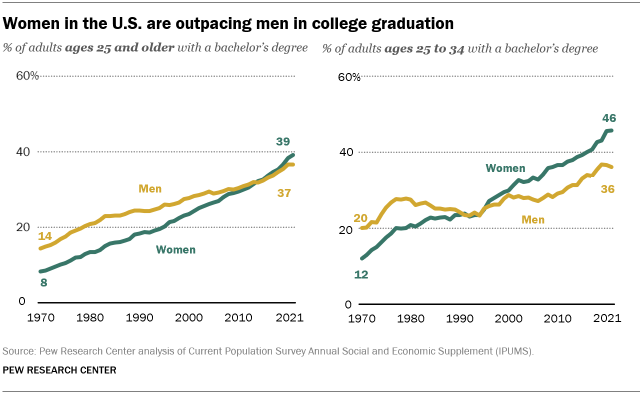
In an October 2021 Pew Research Center survey of Americans without a degree, 34% of men said a major reason why they have not received a four-year college degree is that they just didn’t want to. Only one-in-four women said the same. Men were also more likely to say a major reason they didn’t have a four-year degree is that they didn’t need more education for the job or career they wanted (26% of men said this vs. 20% of women).
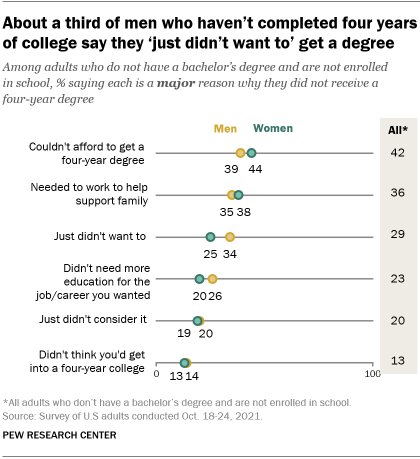
Women (44%) were more likely than men (39%) to say not being able to afford college was a major reason they don’t have a bachelor’s degree. Men and women were about equally likely to say a major impediment was needing to work to help support their family.
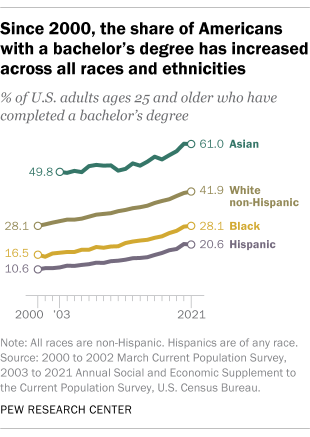
There are racial and ethnic differences in college graduation patterns, as well as in the reasons for not completing a degree. Among adults ages 25 and older, 61% of Asian Americans have a bachelor’s degree or more education, along with 42% of White adults, 28% of Black adults and 21% of Hispanic adults, according to 2021 Current Population Survey data. The share of bachelor’s degree holders in each group has increased since 2010. That year, 52% of Asian Americans had a four-year degree or more, compared with a third of White adults, 20% of Black adults and 14% of Hispanic adults.
The October 2021 Center survey found that among adults without a bachelor’s degree, Hispanic adults (52%) were more likely than those who are White (39%) or Black (41%) to say a major reason they didn’t graduate from a four-year college is that they couldn’t afford it. Hispanic and Black adults were more likely than their White counterparts to say needing to work to support their family was a major reason.
While a third of White adults said not wanting to go to school was a major reason they didn’t complete a four-year degree, smaller shares of Black (22%) and Hispanic (23%) adults said the same. White adults were also more likely to cite not needing more education for the job or career they wanted. (There weren’t enough Asian adults without a bachelor’s degree in the sample to analyze separately.)
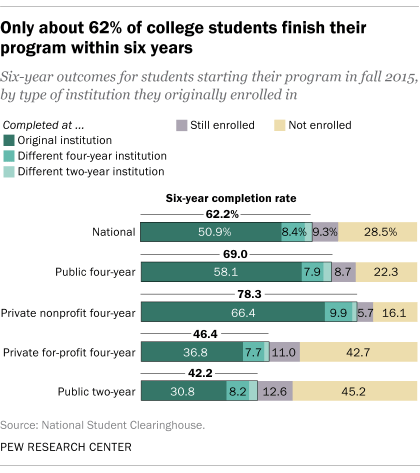
Only 62% of students who start a degree or certificate program finish their program within six years, according to the most recent data from the National Student Clearinghouse , a nonprofit verification and research organization that tracked first-time college students who enrolled in fall 2015 with the intent of pursuing a degree or certificate. The degree completion rate for this group was highest among students who started at four-year, private, nonprofit schools (78.3%), and lowest among those who started at two-year public institutions (42.2%).
Business is the most commonly held bachelor’s degree, followed by health professions. According to the National Center for Education Statistics , about a fifth (19%) of the roughly 2 million bachelor’s degrees conferred in 2019-20 were in business. Health professions and related programs were the second most-popular field, making up 12.6% of degrees conferred that year. Business has been the single most common major since 1980-81; before that, education led the way.
The least common bachelor’s degrees in 2019-20 were in military technologies and applied sciences (1,156 degrees conferred in 2019-20), library science (118), and precision production (39).
There is a growing earnings gap between young college graduates and their counterparts without degrees. In 2021, full-time workers ages 22 to 27 who held a bachelor’s degree, but no further education, made a median annual wage of $52,000, compared with $30,000 for full-time workers of the same age with a high school diploma and no degree, according to data from the Bureau of Labor Statistics. This gap has widened over time. Young bachelor’s degree holders earned a median annual wage of $48,481 in 1990, compared with $35,257 for full-time workers ages 22 to 27 with a high school diploma.
The unemployment rate is lower for college graduates than for workers without a bachelor’s degree, and that gap widened as a result of the coronavirus pandemic. In February 2020, just before the COVID-19 outbreak began in the U.S., only 1.9% of college graduates ages 25 and older were unemployed, compared with 3.1% of workers who completed some college but not a four-year degree, and 3.7% of workers with only a high school diploma. By June 2020, after the pandemic hit, 6.8% of college grads, 10.8% of workers with some college, and 12.2% of high school grads were unemployed.
By March 2022, the unemployment rate had nearly returned to pre-pandemic levels for college graduates (2%) while dropping to 3% among those with some college education but no four-year degree, and 4% among those with only a high school diploma.
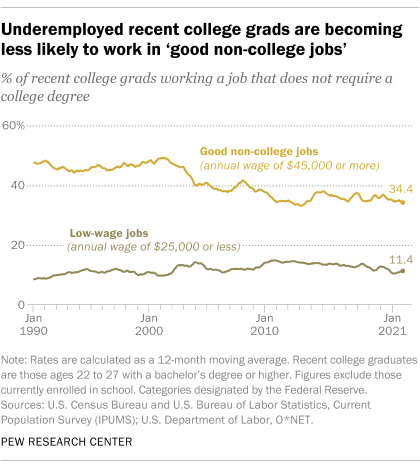
Recent college graduates are more likely than graduates overall to be underemployed – that is, working in jobs that typically do not require a college degree, according to an analysis of Census Bureau and BLS data by the Federal Reserve Bank of New York . As of December 2021, 41% of college graduates ages 22 to 27 were underemployed, compared with 34% among all college graduates. The underemployment rates for recent college grads rose in 2020 as the COVID-19 outbreak strained the job market, but have since returned to pre-pandemic levels.
As of the end of 2021, only 34% of underemployed graduates ages 22 to 27 worked what the Fed defines as “good non-college jobs” – those paying at least $45,000 a year – down from around half in the 1990s. The share of underemployed graduates ages 22 to 27 in low-wage jobs – those earning less than $25,000 annually – rose from about 9% in 1990 to 11% last year.
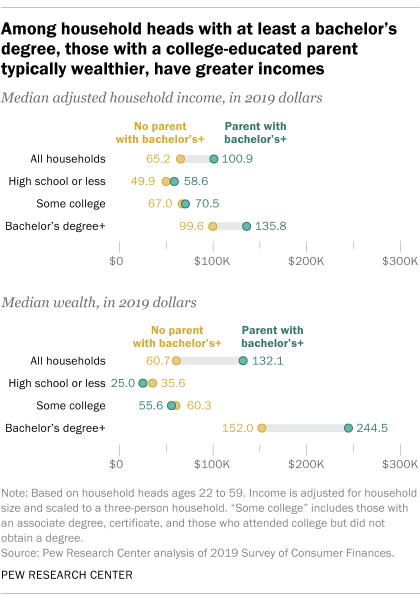
When it comes to income and wealth accumulation, first-generation college graduates lag substantially behind those with college-educated parents, according to a May 2021 Pew Research Center analysis . Households headed by a first-generation college graduate – that is, someone who has completed at least a bachelor’s degree but does not have a parent with a college degree – had a median annual income of $99,600 in 2019, compared with $135,800 for households headed by those with at least one parent who graduated from college. The median wealth of households headed by first-generation college graduates ($152,000) also trailed that of households headed by someone with a parent who graduated from college ($244,500). The higher household income of the latter facilitates saving and wealth accumulation.
The gap also reflects differences in how individuals finance their education. Second-generation college graduates tend to come from more affluent families , while first-generation college graduates are more likely to incur education debt than those with a college-educated parent.
Most Americans with college degrees see value in their experience. In the Center’s October 2021 survey , majorities of graduates said their college education was extremely or very useful when it came to helping them grow personally and intellectually (79%), opening doors to job opportunities (70%) and developing specific skills and knowledge that could be used in the workplace (65%).
Younger college graduates were less likely than older ones to see value in their college education. For example, only a third of college graduates younger than 50 said their college experience was extremely useful in helping them develop skills and knowledge that could be used in the workplace. Among college graduates ages 50 and older, 45% said this.
- Higher Education

About 1 in 4 U.S. teachers say their school went into a gun-related lockdown in the last school year
About half of americans say public k-12 education is going in the wrong direction, what public k-12 teachers want americans to know about teaching, what’s it like to be a teacher in america today, race and lgbtq issues in k-12 schools, most popular.
1615 L St. NW, Suite 800 Washington, DC 20036 USA (+1) 202-419-4300 | Main (+1) 202-857-8562 | Fax (+1) 202-419-4372 | Media Inquiries
Research Topics
- Age & Generations
- Coronavirus (COVID-19)
- Economy & Work
- Family & Relationships
- Gender & LGBTQ
- Immigration & Migration
- International Affairs
- Internet & Technology
- Methodological Research
- News Habits & Media
- Non-U.S. Governments
- Other Topics
- Politics & Policy
- Race & Ethnicity
- Email Newsletters
ABOUT PEW RESEARCH CENTER Pew Research Center is a nonpartisan fact tank that informs the public about the issues, attitudes and trends shaping the world. It conducts public opinion polling, demographic research, media content analysis and other empirical social science research. Pew Research Center does not take policy positions. It is a subsidiary of The Pew Charitable Trusts .
Copyright 2024 Pew Research Center
Terms & Conditions
Privacy Policy
Cookie Settings
Reprints, Permissions & Use Policy
What are you looking for?
Most popular topics.
- Sustainable Aviation Fuel (SAF)
Start your career at Airbus

Be part of the next generation
The future is yours
Every year, university graduates from all over the world join our teams . At Airbus, we are constantly looking for people with the aspiration, enthusiasm and talent to help us move forward and change the world. Our ambition? To pioneer sustainable aerospace for a safe and caring world.
We offer opportunities in all our divisions, in a multitude of functions - engineering, finance, marketing, customer support, procurement, cyber, to name but a few! We are also proud to offer a range of positions worldwide.
Discover our specific programmes dedicated to graduates and let your career take off!
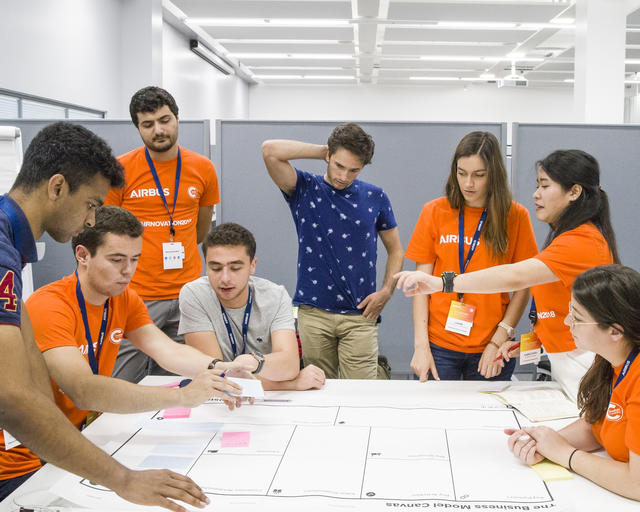
Airbus Global Graduate Programme
The Airbus Global Graduate Programme (AGGP) sees graduates joining teams around the world.
This programme aims to help you take flight with your career, joining on a development pathway that will assist your growth into skilled positions, that are strategically important areas of Airbus.
Applications open 18 September: it's time to fly!
What to expect on the AGGP?
Let’s get you on board
Develop your professional skills
Begin your career at Airbus to learn more about yourself, grow your capabilities and enhance what makes you great.
Build your networks on a global scale
Be part of a global community brought together once a year for a graduate conference to meet your peers, hear from our leaders and learn from the best.
Undertake business rotations
Get the opportunity to switch roles and missions within your department to support your growth and career aspirations.
Gain a unique perspective on Airbus
Learn about the Airbus business, the opportunities and challenges in an industry that is reshaping how we live in our world.

Graduates Programmes in Spain
Start your early career at Airbus Spain! If you're a graduate with an outstanding academic record, a professional English level, a passion for aviation, and an interest in Airbus, you are the perfect fit for our Graduate Programmes in Spain.
Our Spanish Airbus sites consistently seek new interns, offering approximately 250 opportunities each year. Internship positions are available in Getafe, Sevilla, Illescas, Cádiz, and Albacete.
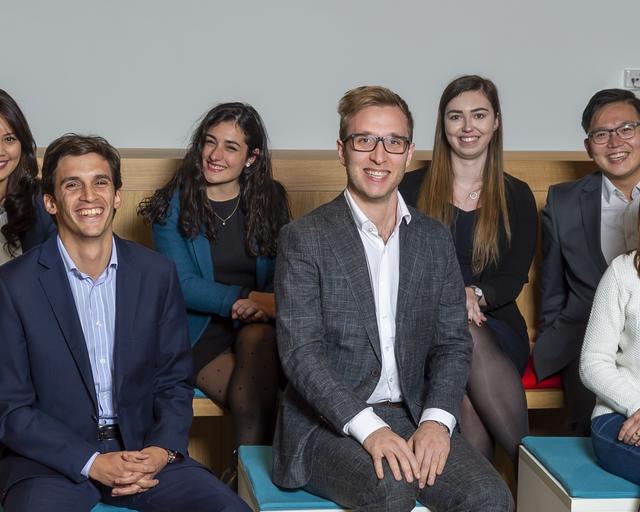
Finance NextGen at Airbus Helicopters
Finance NextGen is a selective 4 year programme to recruit young talented finance professionals to prepare the future of the finance function in Airbus Helicopters.
After 2 years, you will continue to develop your experience by assuming a role in a different function in Finance (e.g. Project Control, Budgetary Control, Treasury, M&A). A great way to develop your skills and knowledge.
Benefits: - Hands-on work experience - Placement opportunities - Mentoring & coaching - International experience
You might wonder
Interested in the Airbus Global Graduate Programme?
How can I be a successful applicant?
You will need to be able to demonstrate:
- Educated to a degree level or equivalent within a relevant field of study - Maximum of 3 years relevant work experience - Strong verbal and written communication in English - A desire to work in a collaborative team environment, focused on driving future innovation - The ability to be self-aware and a wish to be in the driving seat of your development
Please note that each position has specific requirements, be sure to check the adverts for details.
How to apply for the AGGP?
- This year, applications open each September, but only for a short time. - Applications for some programmes may close earlier, apply early to avoid disappointment. - After having submitted your application online, you will have 7 days to complete online testing on receipt of the invitation. - Our team will assess whether you match the requirement of the role. If you do, you will be able to demonstrate your motivation and potential during a virtual assessment centre. - You can then expect to receive an offer within a week!
Can I make several applications?
Please note, we love your interest in working for Airbus but we do ask that you make only one application to the Airbus Global Graduate Programme. We encourage you to take time to decide which of our opportunities is right for you and then submit an application for the role that best represents you, your skills and experience.
Discover other student opportunities
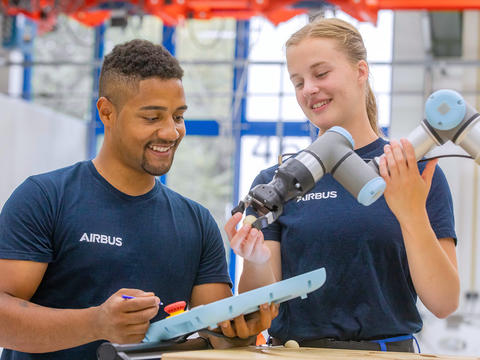
Apprentices
Study whilst getting real-world experience

VIE and PhDs
Shape a unique and ambitious career path with Airbus

UK Industry Placement
Put your theoretical knowledge in practice

IMAGES
VIDEO
COMMENTS
A master's degree is typically not a requirement to enroll in a Ph.D. program. Earning your master's degree may provide benefits if you choose to do so, however it is rarely a requirement of entering a Ph.D. program. There are a few Ph.D. programs that may require you to earn your master's degree before enrolling, so it is important to check ...
The two most common types of graduate degrees are master's and doctoral degrees: A master's is a 1-2 year degree that can prepare you for a multitude of careers. A PhD, or doctoral degree, takes 3-7 years to complete (depending on the country) and prepares you for a career in academic research. A master's is also the necessary first ...
You do not need a master's degree to get a Ph.D. at many universities. Your professional experience may make a master's unnecessary. Skipping a master's features many benefits and some potential drawbacks. You can earn a Ph.D. in a different field than your master's by taking extra classes. It makes sense to think about college degrees as steps.
Do You Need a Master's to Get a PhD? — Conclusion. Whether a Master's degree would be suitable for your career trajectory is a personal question. Applying to graduate school is a great time to check in about your values, and how you want to spend the next chapter of your life. To help choose between a PhD and a Master's, it may be ...
No, a master's degree is not always required to earn a PhD. A number of schools may allow you to enroll in a PhD-level program without having previously obtained your master's degree if you meet the school's and program's admission criteria. In some cases, Ph.D. programs may allow you to skip the need to obtain a master's degree.
Your PhD will likely take an additional 4 to 6 years after earning your master's degree. Con: A master's degree is usually unfunded. Many students find this a big con: Master's students usually do not receive much funding. Most master's programs are paid for out-of-pocket.
Yes, But Not Always. You don't necessarily need a master's in order to pursue a PhD. Some PhD programs accept candidates with a bachelor's degree only, or you may be able to get around a master's prerequisite by signing up for a MPhil or an integrated PhD program. The "ideal" doctorate program doesn't come along often.
Ph.D. study includes a major research project in addition to coursework, and a Ph.D. is the highest scholastic degree awarded by American universities. Contrary to common perception, career paths for Ph.D. graduates are quite varied, not just limited to academia. Ph.D. training helps you hones skills such as writing, research, teaching, data ...
In the United States, you can generally go directly to a PhD with only a bachelor's degree, as a master's program is included as part of the doctoral program. Elsewhere, you generally need to graduate from a research-intensive master's degree before continuing to the PhD.
The short answer is that it is possible to do a PhD without a Masters. The long answer is that it is dependent on your personal experience, your subject area, the duration of your PhD programme and the location, as requirements can vary by country. It's technically possible in any discipline, but much more common in STEM or vocational subjects.
Requirements to apply. Pursuing a PhD requires a master's degree in a related field. Admission is highly competitive, and universities often seek exceptional academic achievements, relevant research experience, strong letters of recommendation, and a compelling research proposal.
Updated: Jan 01, 2024. Do you need a master's to a get a PhD? No! A master's degree is not a universal requirement for all PhD programs, and there are some types of programs which waive the master's degree. If you're interested in how to get a PhD but you want to shorten the time it takes to graduate, you do have options.
Many universities allow you to apply to a PhD degree program without a master's degree. Some schools will require that you earn a masters along the way, though. By getting a PhD without a master's, you may have a chance to save time and money. That said, it may be more difficult to get accepted or to compete with other applicants if you don ...
The big exception is, however, the USA. It is actually very uncommon for students to do a Master's before their PhD That is because American universities don't have this as a strict requirement. At the same time, it is also true that doctoral studies in the USA take anywhere between 6 and 8 years while in the EU are designed to last 3-4 years.
You generally earn a Master's in the first two years of a PhD program. They meant that the "Master's route" they laid out—getting a Master's first, then a PhD—would take longer than just getting a PhD. A Master's will allow you to skip early PhD classes in many STEM programs. The time will be about the same.
Yes, you can get a PhD without having a Masters degree. Some come straight from the bachelor's degree with no issues. The prerequisites for a PhD vary by field and institution, but there are circumstances where exceptional undergraduates may transition directly into a PhD program. For this, you need to demonstrate exceptional academic ...
Kee says funding for a humanities Ph.D. program typically only lasts five years, even though it is uncommon for someone to obtain a Ph.D. degree in a humanities field within that time frame ...
However, the customary path to get a PhD is to obtain a bachelor's degree preceded by a master's degree, then comes the PhD. Nonetheless, a few students prefer to avoid a master's degree to get enrolled in a doctoral program in order to complete their studies earlier. So, stick to this article till the end to get the answer for can you ...
Summary. An Integrated Masters with a PhD (iPhD) is a four-year postgraduate level programme that combines a one-year Masters course with a three-year PhD course. They allow students to familiarise themselves with their chosen topic, research methods and academic writing techniques before embarking on their own independent research project.
School of Medicine offers several master's and PhD-level graduate programs for students interested in pursuing careers in health and biomedical sciences research. Our graduate students conduct their thesis work in faculty labs, where their basic, translational and clinical research advances our understanding of human development and disease ...
Should you be accepted into a PhD programme without a Masters, the usual process will be to first register you as an MPhil student. You will then have a year to prepare and submit a thesis. Your thesis will need to detail the research you have carried out within that year and outline how you intend to continue it into a full PhD study.
Notes: (1) The tuition fee values for the second Master's is based on the average fees for an MSc. (2) The above table assumes a second Master's duration of 1 year and a PhD duration of 4 years. (3) The fees and durations are indicative - the exact values vary depending on the course and university. It's also important to bear in mind ...
The median BLS salary for psychologists include both graduate and undergraduate level occupations. According to Payscale, of the 25 people reporting in September 2023, the average salary for graduates with a Ph.D. in psychology is $95,000. September Payscale data for 2023 reports the average salary for graduates with a Psy.D. as $92,000.
In certain countries, students are led to believe that they need to first get into a masters program, then enroll in a PhD program for further study. This is not how the system works at Cornell or in the US in general. If your ultimate goal is to get a PhD, you should enroll in a PhD program. A PhD program typically takes 5-6 years to complete.
2:00. The University of Texas at Austin is in the news once again for its academic successes, this time with its graduate programs. U.S. News & World Report partially released its rankings of the ...
A Ph.D. from National University costs $26,520, while the same degree from Kennesaw State University costs a minimum of $18,384. However, the tuition rates for Ph.D. programs vary significantly ...
In a reversal, women are now more likely than men to graduate from college, according to the Current Population Survey. In 2021, 39% of women ages 25 and older had a bachelor's degree or more education, compared with 37% of men in the same age range. The gap in college completion is even wider among adults ages 25 to 34: 46% of women in this ...
UVA School of Education and Human Development Offers No. 2 Best Online Graduate Education Program in the Country. The school tied for second place in the latest U.S. News and World Report ranking of online graduate education programs and was also named the top online education master's program for veterans.
Master of Economics is ranked 5th in "15 Highest-Paying Master's Degrees You Can Get in 2023" by indeed.com and ranked 13th in "45 Graduate Degree Jobs That Pay More Than $100K" by US News & World Report. There is a strong market demand for individuals who can do quantitative economic analysis using causal inferencing and forecasting.
AGGP. The Airbus Global Graduate Programme (AGGP) sees graduates joining teams around the world. This programme aims to help you take flight with your career, joining on a development pathway that will assist your growth into skilled positions, that are strategically important areas of Airbus. Applications open 18 September: it's time to fly!